Complaints About Food?-
Understanding One’s True Motivation

Rabbi Shalom Rosner


Rav Kehilla, Nofei HaShemesh
page 28
Hinting One Does Not Want an Aliya
Rabbi Daniel Mann
Eretz Hemdah
page 54


Complaints About Food?-
Understanding One’s True Motivation

Rabbi Shalom Rosner


Rav Kehilla, Nofei HaShemesh
page 28
Hinting One Does Not Want an Aliya
Rabbi Daniel Mann
Eretz Hemdah
page 54

04Dear Torah Tidbits Family
Rabbi Avi Berman
08Moving People Rabbi Moshe Hauer
10Aliya By Aliya Sedra Summary
Rabbi Reuven Tradburks
16A Second Chance
Rabbi Dr. Tzvi Hersh Weinreb
20From Despair to Hope
Rabbi Lord Jonathan Sacks zt"l
26Probing The Prophets
Rabbi Nachman Winkler
28Complaints About Food?Understanding One’s True Motivation
Rabbi Shalom Rosner
30Living Light Rebbetzin Shira Smiles
32OU Israel Schedule
38Bon Appetite! Rabbi Judah Mischel
HELPFUL REMINDER KIDDUSH LEVANA
42Introduction to Bishul Akum, part 2
Rabbi Ezra Friedman
Rabbi Sam Shor
44Simchat Shmuel
46Apocalyptic Fantasy
Rabbi Moshe Taragin
50Exile Relies on the Land
Rabbi Aaron Goldscheider
52The Call of The Grape Vine and Fig Tree Rebbetzin Dr. Adina Shmidman
54Hinting One Does Not Want an Aliya
Rabbi Daniel Mann
56The Bikkurim Festival at Agricultural Settlements in the Early Zionist Period #2
Rabbi Moshe Bloom
58A Double Pidyon Haben
Rabbi Gideon Weitzman
60The Y- Files Weekly Comic Netanel Epstein
62Torah 4 Teens By Teens
Ariel Werblowsky // Joseph Friedman
Last Opportunity to Say Kiddush Levana until 15 Sivan/ Sat. night June 3 until 9:52 pm
Painting by Malka Katz (Newman)
I'm from London, and I live in Jerusalem now. Meaning: It’s the Shabbat candles. I painted them like trees with strong roots, with bright flames. All the lines coming in from the side forming the candles, is like the energy we put in towards Shabbat from the week.
To contact the artist: malkanewman@hotmail.co.uk

Ranges 11 days Wed - Shabbat
May 31 - June 10 / 11-21 Sivan
Earliest Tallit and Tefillin 4:31 - 4:29
Sunrise 5:31 - 5:29
Sof Zman Kriat Shema 9:03
Magen Avraham 8:19 - 8:18
Sof Zman Tefila 10:13 - 10:14
(According to the Gra and Baal HaTanya)
Chatzot (Halachic Noon) 12:35 - 12:37
Mincha Gedola (Earliest Mincha) 1:11 - 1:12
Plag Mincha
6:11 - 6:16
Sunset (Including Elevation) 7:39 - 7:44
Seymour J. Abrams • Orthodox Union Jerusalem World Center • Avrom Silver Jerusalem College for Adults • Wolinetz Family Shul • Makom BaLev • Birthright • Yachad • NCSY in Israel • JLIC in Israel • Camp Dror • Pearl & Harold M. Jacobs ZULA Outreach Center • The Jack Gindi Oraita Program • OU Israel Kashrut
STUART HERSHKOWITZ, PRESIDENT OU ISRAEL
Zvi Sand / Yitzchak Fund: Former Presidents, OU Israel

| Rabbi Emanuel Quint z”l, Senior Vice President | Prof. Meni Koslowsky, Vice President
VAAD MEMBERS:
Michael Elman | Yonatan Frankel | Yitchak Fund | Daniella Hellerstein | Stuart Hershkowitz | Jeremy Lustman | Meir Raskas | Atara Reichel | Zvi Sand | Norman Schmutter | Mark Schneider | Esther Williams
RABBI AVI BERMAN, EXECUTIVE DIRECTOR, OU ISRAEL
Times According to MyZmanim (20 min. before sundown in most cities, 40 min. in Yerushalyim and Petach Tikva, 30 min. in Tzfat/Haifa)
Daf Yomi this Shabbat: Gittin 18
OU Kashrut NCSY Jewish Action JLIC NJCD / Yachad / Our Way OU West Coast OU Press Synagogue/Community Services OU Advocacy OU Israel
MITCHEL R. AEDER, PRESIDENT OF THE ORTHODOX UNION Yehuda Neuberger, Chairman of the Board, Orthodox Union | Dr. Josh Penn, OU Kashrus Commission

RABBI MOSHE HAUER, EXECUTIVE VICE PRESIDENT | RABBI JOSHUA M. JOSEPH, ED.D. EXECUTIVE VICE PRESIDENT & CHIEF OPERATING OFFICER
Rabbi Dr. Tzvi Hersh Weinreb, Exec. V.P. Emeritus
OU KOSHER: Rabbi Menachem Genack, CEO/Rabbinic Administrator OU Kosher | Rabbi Moshe Elefant, COO/Executive Rabbinic Coordinator ISRAEL: Rabbi Yissachar Dov Krakowski, Rabbinic Administrator | Rabbi Ezra Friedman, The Gustave and Carol Jacobs Center for Kashrut Education/ Deputy Rabbinic Administrator
Headquarters: 40 Rector St. 4th floor, New York, NY 10006 212-563-4000 website: www.ou.org
Editor Emeritus: Phil Chernofsky
Editor: Rabbi Aaron Goldscheider | aarong@ouisrael.org
Advertising: Ita Rochel | 02-5609125 or ttads@ouisrael.org
Website: www.torahtidbits.com
Not getting enough TTs? Too many? None at all?
Contact our DISTRIBUTION 050-577-2111 • ttdist@ouisrael.org
David Katz, CFO, OU Israel | Chaim Pelzner, Director of Programs, OU Israel | Rabbi Sam Shor, Director of Programs, OU Israel Center Rabbi Sholom Gold, Dean, Avrom Silver Jerusalem College for Adults
22 Keren HaYesod <> POB 1441 <> Jerusalem
9101032
phone: (02) 560 9100 | fax: (02) 561-7432
email: office@ouisrael.org
website: www.ouisrael.org
Founders and initial benefactors of the OU Israel Center: George and Ilse Falk a"h
Torah Tidbits and many of the projects of OU Israel are assisted by grants from THE JERUSALEM MUNICIPALITY
OU Israel, Torah Tidbits does not endorse the political or halachic positions of its editor, columnists or advertisers, nor guarantee the quality of advertised services or products. Nor do we endorse the kashrut of hotels, restaurants, caterers or food products that are advertised in TT (except, of course, those under OU-Israel hashgacha). Any "promises" made in ads are the sole responsibility of the advertisers and not that of OU Israel, the OU Israel Center , Torah Tidbits.
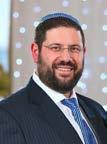
Every day when we say Psukei D’zimra during Shacharit we say the verse,
Lord rebuilds Yerushalayim; He gathers in the exiles of Israel.” I’ve always wondered if this pasuk in Tehillim meant that kibbutz galuyot would take place only after we build the city of Yerushalayim, or if we will see the building of Yerushalayim once all of Klal Yisrael returns home. I also considered the possibility that both stages would happen simultaneously. After the experiences I had during the days leading up to Shavuot and on leil Shavuot itself I finally found my answer.
For any Yerushalayim traveler, traffic seems to be at an all time high due to construction taking place at what seems to be every major intersection around the city. As frustrated as I have been with the increase in traffic that I sit in daily on my way to and

from work, I was deeply moved by an experience I had that changed my perspective on the construction dust, the concrete mixers, the drilling and the detours. Believe me, I am just as surprised as you to be inspired by something as dreaded as traffic, but let me share with you what happened.
Last week I was invited by the Jerusalem Municipality to join a private tour of the city’s building projects together with OU Israel’s COO, Natan Kandler. We were taken to the roof of the Vert Hotel and shown the near-term and long-term building plans for Yerushalayim. From 20 stories

The OU Israel Family sends deepfelt condolences to Gary & Ricky Magder and families on the passing of their mother
Sima Zlata Magder a"h
high I couldn’t count the number of cranes I saw around Yerushalayim. Our guide showed us where the light rail will extend to reach new neighborhoods, hospitals and landmarks. He showed us where they plan to build more residential and commercial sites to make room for more residents and career opportunities. He also detailed their plans to create bike lanes throughout the city and explained the plans for construction at the original Shaare Zedek Hospital and Binyanei HaUma. With every construction site, the vision of the Jerusalem Municipality became clearer and I was left speechless.
The following morning when davening Shacharit I found myself struck by the words




as I reflected upon my experiences the day before. Later, when I drove into work and found myself sitting in traffic once again, my commute took on a different meaning. I realized that I can’t complain about traffic and congestion in the streets of Yerushalayim while also asking HaShem to gather the exiles from around the world. Moreover, we can’t ask HaShem to change something without putting in any effort of our own. Therefore, every new construction project signals the partnership we have with HaShem to bring His children home.

With these feelings of inspiration I entered Shavuot, which I spent once again

in Yerushalayim together with my colleagues at the OU Israel Center. This year’s night of dynamic leil Shavuot programming featured shiurim by Rabbi Moshe Hauer, Rabbi Yaakov Kermaier, Rabbi Dr. Aaron Adler, Rabbi Sam Shor and Rabbi Aaron Goldscheider. Together with the crowds that attended, I enjoyed the divrei Torah very much, and extend a tremendous yasher koach to my OU Israel team for pulling off such a wonderful night of learning.
At one point I stepped out to reconnect with my good friend Stan Hillelson who was visiting from New York. During our conversation we were stopped numerous times by foreigners on the street - including a group visiting from Germany - who asked which shiurim were being offered and if any would be given in their native tongue. Will any shiur be in Spanish? German? French? Russian? Finally Stan turned to me and said, “Avi, this is kibbutz galuyot !

These Jews are coming from countries near and far and filling the streets of Yerushalayim. It’s finally happening.”
Needless to say, if someone would have told me that construction and foreign tour groups would infuse my Shavuot with intense meaning I wouldn't have believed it, and yet I ended chag on a high. Our prayers are coming true before our eyes. It is nothing short of a miracle that Yerushalayim is a vibrant city that is constantly evolving to meet the needs of its growing residentsphysically and spiritually. In time, I imagine OU Israel will have to adapt our programs to reach broader audiences of Olim so they too can feel welcome and inspired.
May we continue to see the brachot of traffic and construction as we prepare Yerushalayim to welcome our brethren home. I’ll extend my gratitude to Moshe Lion, Mayor of Yerushalayim, and his team for supporting the growth of this precious city. Finally, I wish a tremendous mazal tov to Aviva Miller who won the raffle for an aerial tour of Yerushalayim, which we opened during the Leil Yom HaAtzmaut Tefillah Chagigit ! As impactful as my 20-story-view of Yerushalayim was, I cannot wait to see the photos you take of our beautiful city from the helicopter.
Wishing you all an uplifting and inspiring Shabbat,
Rabbi Avi Berman Executive Director, OU Israel aberman@ouisrael.orgFamily
In loving memory of our parents, grandparents and great-grandparents
but you could possibly do them. For when it comes to communications from G-d, you are unique, irreplaceable, sui generis, one of a kind.
This exchange presents a fundamental principle of the Torah: that G-d speaks to Moshe in a way that He does not, nor will He in the future ever do again with anyone else. When Moshe says that people come to him seeking G-d, what he means is: I have access to G-d. He speaks to me. (Speaking to G-d isn’t the trick; the trick is when He answers back.) Similarly, when Moshe says that he teaches G-d’s law, what he means is that G-d communicates those laws to him and to no one else.
This could very well be the prime purpose of this Yitro story. For, in the very next story, the giving of the Torah, the very same theme of Moshe’s uniqueness as the one to whom G-d speaks is central.
3 aliya (18:24-27) Moshe heard. He chose judges, with only the most difficult cases brought to him. Moshe sent Yitro home.
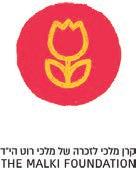
It takes an honest leader to accept suggestions to improve. Moshe displays his honesty and humility – if the suggestion is good, embrace it. Just as Yitro accepted the news of the Exodus and affirmed One G-d,




kerenmalki.org

02-567-0602

Keren Malki empowers families of children with special needs in Israel to choose home care. Donations are tax-approved in Israel, US and UK.



Honoring the memory of Malka Chana Roth ד”יה 1985-2001, killed in the Sbarro bombing.

How do we effect real change and positively impact other people?

In our parsha (8:6), Moshe is instructed to “take the Levi’im (Levites)….” Rashi notes – as he does in several other places – that when the Torah speaks about “taking” a person it is not speaking of a physical movement of that person but of persuasion, “taking him with words,” k’chenu b’dvarim. In this case, for example, Moshe needed to inspire the Levi’im by conveying how fortunate they were to have been chosen for their holy task.
Maharal of Prague explains this approach of Rashi by noting that the essence of a person is his or her mind, da’as. As such, simply having someone use their power or any external force to physically move the other from one place, position, location, or association to another, would not truly constitute ‘taking’ them. While that works for objects, people are only truly ‘moved’ when we win over their hearts and minds and change how they view and feel about something. In our efforts to impact others we do not exert true influence by using our power to force external change. We must instead figure out how to get under their skin, using genuine understanding to influence the way they
think about things. This approach is critical to our success in educating our children, students, congregants, and community.
It may, however, be no less critical in our encounter with the world around us.
Antisemitism is the longest hatred, and we cannot naively believe that we will rid the world of it. Instead, we must work diligently to defend ourselves against it and seek alliances and support amongst those who stand up for us and against this terrible evil. Thank G-d, we are blessed with many such allies in this battle, and we are grateful to them. But our efforts must not be limited to the transactional, moving the pieces in political negotiation to our advantage. We must never despair of being worthy of the ultimate and elusive prophetic vision for the world, where the Jewish people are truly seen as a source of blessing for everyone. As a people we must aspire to move and to influence people with our words, ideas, and values in pursuit of our ultimate aspiration of winning the hearts and minds of the world, until the day that (Yeshayahu 60:3) “nations shall walk by your light and kings by your shining radiance.”

May the Torah learning in this issue of TT be in memory of Sandy Katz Rotter a”h on her 25th Yahrzeit



Parshat Beha’alotcha is one of the richest of the parshiot of the Torah. In it the preparation to march to the Land is completed; off we go, the march begins. It is the pivot from the sublime to the practical, from the ideal to the real, from theory to practice. In other words: people, warts and all come to the fore. There is complaining, disappointment, pettiness, disputes, frustrations. It is communal life in Technicolor. And that is its profundity. You see, if we were to stop the Torah here, we would imagine Jewish life to be a fairytale: G-d promised the Land, sweeps us out of slavery, gives us the Torah, wants to dwell in our midst, creates a place of rendezvous of man and G-d, gives us days to meet with Him, and instructs us in choreographed detail how to march in life with
Him. Beautiful. Then we would look at our lives – feeling parched, distant, chaotic – where is He, where is the order, the choreography, the Mikdash? We could feel the Torah is a fairytale, of living with G-d in a way we are unfamiliar. But then there is Beha’alotcha and the rest of Bamidbar. As if G-d says: I have shown you the ideal. And I know full well your complexities. I expect some of you to be dissatisfied, bored, jealous, resentful. Skeptical, cautious, weak. Man is complicated. I, G-d says, know that perfectly well: I made you that way. Your job as a people is to figure out a way to live reaching for the ideal while living all the complexity that man is: all the differences, the divisions, the struggles, the talents, the weaknesses and the aspirations. Beha’alotcha assures us that the ideal is to aspire to, while the real is to manage.
1st aliya (Bamidbar 8:1-14)
Aharon is instructed to light the Menorah. The instructions concerning how the Leviim are to be purified and inaugurated through immersion and offerings are given. In so doing the Leviim are to be separated to be Mine.
These are the last verses of communal, national preparation to march to the Land. The Leviim are to serve the Kohanim.
Erev Shavuot Rudman and Manesberg Families2nd aliya (8:15-26) The Leviim are to replace the first-born who are Mine after the plague of the first-born. The Leviim are to assist the Kohanim in maintaining the sanctity of the Mikdash. They are inaugurated and purified. They are to serve from ages 25-50, but not to do the offerings.
Just as for the Kohanim and for the
ל"ז היסירו לשיפ ןב דוד נ"על
In memory of our honored father
David Rudman ל"ז who died in our infancy, on his 89th yahrzeit
and our next step will be to plant a fruit tree. I never thought of myself as being the agricultural type, but the feeling of settling and planting a portion of Eretz Yisrael, has been truly euphoric. Iy”H, when we plant our tree, and eat the fruits that will grow one day, I think we will be able to truly appreciate that unique Kedusha found in the fruit of Eretz Yisrael!
leaders, the ceremony of inauguration impresses on the Leviim that their special status is not mere privilege; it is service of the people, and service of G-d. A sense of entitlement or of privilege is the poison of communal leadership; a sense of service, its elixir.
3rd aliya (9:1-14) Moshe instructs the people to do the Pesach in the first month of the second year. They do so, though some are unable due to their Tuma impurity. They query Moshe as to why they should be denied bringing the Pesach due to contact with the dead. Moshe defers to what G-d will tell him. He is instructed: all who are unable to do the Pesach in its proper time, due to Tuma or being distant from the Mikdash, may do it in the second month.
To conclude, when you buy your Tu B'shvat fruit this year, don’t search for those dried apricots and banana chips imported from Turkey. Rather, head over to the fresh produce and buy yourself some nice juicy Kedusha-filled Jaffa oranges and thank Hashem for bringing you to this land in order to be able to הבוטמ עבשלו הירפמ לוכאל, imbibing that Kedusha in every bite that you take!!
Even though the book of Bamidbar began on Rosh Chodesh of the 2nd month in the 2nd year, we have here a description of the first Pesach observed after leaving Egypt, which is on the 14th of the 1st month. Seems to be out of order. And the description of all the leader’s offerings in Naso occurred on the first days of the 1st month. But the out of order is deliberate, for it wants to juxtapose the beginning of the March with the uncertainty of Moshe
Mazal Tov to Joseph John Samuels on his 90th birthday with much love from his sister Gwen Families Cohen, Eliaz, Aharoni, Samuels, Jacobs and Horwich
BEAUTIFUL
186 SQM SPLIT-LEVEL HOME WITH 80 SQM BALCONIES
6 BDRMS, 3 FULL BATHROOMS, 2ND FLOOR, UNDERGROUND PARKING, STORAGE, EXCELLENT CONDITION, CHURCHLAND UNTIL 2077 ASKING PRICE: NIS 6,000,000
FOR RENT IN A NEW BUILDING ON AGRIPAS ST #6 AND #8 NEXT TO KING GEORGE
2-ROOM APTS, 2ND-7TH FL, 60 SQM- 5500-6900 NIS
3-ROOM APTS 4TH AND 7TH FL, 70-80 SQM - 7800 NIS ONE 4-ROOM APT, 1ST FLOOR, 102 SQM, 2 BALCONIES8,700 NIS
ONE 5-ROOM APT, 133 SQM, 6TH FL, 3 DIRECTIONS, BRIGHT, VIEWS -11,900 NIS
APTS ARE ALL BEAUTIFUL, BRAND-NEW WITH BALCONIES, UNDERFLOOR HEATING, A/C, 2 ELEVATORS (ONE SHABBAT), OPTION TO FURNISH IF NEEDED
Ilana Nelson 054.5341403
www.integrityrealestate.co.il



and Pesach. The theme of our book is the march to the Land of Israel. The leader’s offerings display their self-perception: we are servants of G-d, not self-serving. So too the bringing of the Pesach. We are all, all of us, servants of G-d, not self-serving. So too the bringing of the Pesach. We are all, all of us, servants of G-d, not self-serving. And the inquiry to Moshe from those who are impure is dramatic foreshadowing. Even though everything has fallen into place perfectly – the camp is set, the Mishkan in the middle, the leaders altruistic, the people dedicated – but get ready. Because things unexpected are, well, to be expected. All the planning in the world cannot avoid the expected unexpected of life. And that is the powerful theme of the rest of this parsha, foreshadowed by the uncertainty of how to accommodate the impure and their Pesach. Expect that things are going to happen that you just didn’t expect.
4th aliya (9:15-10:10) The cloud descended on the Mishkan by day; by night it appeared as a fire. When it lifted, the people traveled; where it settled, the people settled. It could remain in place for a long time or just overnight, or a few days or a month. The people encamped and traveled by Divine signal. Moshe was instructed to make 2 silver trumpets. When both were sounded, the people were to gather; when just 1, the leaders would gather. A teruah would
signal to travel; tekiah, to gather. In wartime, sound a teruah; on holidays and joyful occasions, sound a tekiah.
This aliya poetically describes Jewish travel: guided by the Divine, while called by the trumpets. It is the Divine-human partnership. He calls; we call (through the trumpets). So, while guided by G-d, it is we who manage the people. And that foreshadows all that is to come; the messy business of managing people.
5th aliya (10:11-34) On the 20th of the 2nd month the cloud lifted; the people traveled from the desert of Sinai to the desert of Paran. The camp traveled just as had been instructed; each tribe in its designated position. Moshe asked his father-in-law Chovev (Yitro) to travel with them, for his insight would be valuable. He demurred, returning to his land. They traveled for 3 days.
The march to the Land of Israel begins. And Moshe is well aware of its challenges. While he is unique in the workings of the Divine, his father-in-law Yitro has shown how masterful he is in the workings of the people, when he instructed Moshe back in parshat Yitro to create a system to judge the people. Moshe desperately wants Yitro’s guidance in managing the inevitable, the expected unexpected. While Moshe knows the challenges of life that await him, urging Yitro to be his advisor for those challenges, even he is surprised at how quickly the challenges of human foibles arise.
6th aliya (10:35-11:29) Moshe would pray upon travel: G-d, disperse Your enemies. And upon rest: Return the myriads. The people complained, angering both G-d and Moshe,
been memorialized in a popular song, "An eternal people does not fear the long and arduous path."
be in loving memory and נ"על our dear parents whose yahrtzeits are in Kislev
052-385-9944
Doris Weinberger a"h
ולסכ 'ד -ה"ע המלש לאקזחי תב האל הרובד
Max Weinberger z”l
ולסכ ז"כ -ל"ז בד ןב ךלמילא
Greatly missed by their children, grandchildren and great grandchildren
Rav Aryeh and Dvora Weinberger
Bernie and Leah Weinberger
Menachem and Hannah Katten
Patience is necessary for those who follow Isaac's way. But a wise woman taught us that patience is but another name for hope. That woman was Jane Austen, who put these words into the mouth of one of the characters in her great novel, Sense and Sensibility: "Know your own happiness. You want nothing but patience—or give it a more fascinating name: call it hope."
In observance of the Shloshim of our friend

Yehuda Leib Berren z"l
a fire burning on the camp’s edge. They called to Moshe, Moshe prayed and the fire abated. A group amongst them cried for meat, recalling the fish and produce they ate freely of in Egypt: We are parched with just this Manna. G-d and Moshe were angry. Moshe complained: am I to hold them like a baby? Where am I to find meat to feed them all? I cannot bear them alone. G-d responded: gather 70 elders. I will give them some of your spirit and they will assist you. And I will provide meat. G-d’s spirit flowed to the 70 elders; Eldad and Medad continued to prophecy.
Rav Menachem Weinberg will give a shiur in his memory "Heroic Joy"

Monday evening, 23 November/ 8 Kislev
7:30pm
Zoom Meeting: 853 8980 1519
Password: Yehuda
Here begins the rest of the book of Bamidbar: the pivot from the ideal world of Divine guidance to the real world of human complexity. The first complaint comes fast; and we aren’t even told what they are complaining about. Because life will never be satisfying to everyone. The second complaint, the complaint for meat, is the dissatisfaction of the Manna. It is boredom. Desire for pleasure, for color and variety. Though an obvious distortion of reality: is the grass of Egypt really greener, was Egypt truly so pleasant? G-d will provide the meat. The elders will provide assistance. But as for the burden of cuddling the infant that Moshe feels he has been unfairly burdened with? As my friend Shmuel Goldin points out: that, Moshe, is what leadership is. Assisting the people as their nurse. Listening. Empathy. Support. Patience. Even when their demands are unfair and excessive. That is the lot of the leader. You’ll need to learn that on your own.
7th aliya (11:30-12:16) A wind brought quail, covering the earth. The place was called
Kivrot Hataava. Miriam and Aharon spoke ill of Moshe’s wife; Moshe was the humblest of all people. G-d spoke to Moshe, Aharon and Miriam, calling to Aharon and Miriam. I speak to you in dreams: not so to Moshe. He I speak to face to face. Miriam became leprous. Moshe prayed for her healing.
The complaints continue; this time from an unexpected source, Aharon and Miriam. This challenge is brief but powerful. The challenges, conflicts, disagreements that arise in life are not to be seen as pettiness and weakness alone. Even the greatest of the great of our people can have disagreements with our leaders. That is a crucial perspective on all the challenges to come; human beings will never be free of disagreement or challenge. It is not just lusting for meat. It is even the holiest of the holy who legitimately, but here incorrectly, question our most holy of leaders.
The highlight of the haftorah describes the beautiful golden Menorah in the Beit
Hamikdash. This parallels the Menorah mentioned at the opening of the parsha, which was lit daily by Aharon, the Kohen Gadol.
The vision comes to Zechariah prior to the building of the second Beit Hamikdash. We are able to get a sense from the wording in this passage of the great joy that will prevail with God’s presence returning to Jerusalem.
The Almighty also speaks of the great reward that will be given to Yehoshua, the first Kohen Gadol to serve in the second Beit Hamikdash, if he and his descendants follow the directives of the Torah. The ultimate reward is, “Behold! I will bring My servant, the Shoot,” an allusion to Mashiach, the Shoot of David.
The prophet then describes the actual seven-branched Menorah that he is able to discern in a prophecy. Its deeper meaning is to be understood in the following way: “Not by military force and not by physical strength, but by My Spirit…” The light of the Menorah represents the power of the Mashiach to fulfill his task and bring goodness and light to the world.
BY RABBI CHANOCH YERES R av, Beit Knesset Beit Yisrael, Yemin MosheIn this week’s parsha there is the story of the murmurings of the people. G-d instructs Moshe that the solution is within the seventy elders of Israel.
(Bamidbar 11:16) “And G-d said to Moshe, Gather unto Me seventy men of the elders of Israel.”
How could the gathering of these elders serve to resolve the murmurings and complaints of the people?
Rabbi Shimshon Rafael Hirsch answers that G-d was really saying to Moshe “Although they complain about the lack of physical needs like meat, it is clear that what is actually lacking in the Jewish people is spirituality- faith”. Therefore, gather seventy men from the elders of the nation, who have witnessed great miracles of G-d, and let some of the spirit within them shine out to the rest of the nation. Grant the people spiritual nourishment that they may be satiated and appreciate the gifts that G-d has attained for them. Once this goal is reached, they will no longer cry out for meat.
Shabbat Shalom36th of the 54 sedras; 3rd of 10 in Bamidbar
Written on 240 lines, ranks 10
16 Parshiyot; 11 open, 5 closed
One of the parshiyot (a S'TUMA) is separated from the parshiyot before and after it by more than blank space (as is usual) - namely, backwards NUNs. Consequently, it is the "loneliest", most isolated of all parshiyot in the Torah
136 p'sukim, ranks 11th, 4th in Bamidbar
1840 words, ranks 12th, 3rd in Bamidbar
7055 letters, ranks 12th, 4th in Bamidbar
5 mitzvot; 3 positives, 2 prohibitions.
To illustrate the "lopsided" distribution of mitzvot in the Torah, B'haalot'cha has more mitzvot
JERUSALEM SALES
SHAAREI CHESSED / RECHAVIA
*Stunning Duplex! 5 bdrms (2 en suite) 25 sqm kitchen, succah, 2 parking, storage.
*Renovated 110 sqm 3 bdrms, 1st floor, succah.
*Beautiful 3 bdrm apt + 50 sqm succah balcony, shabbat elevator, parking and view.
*Renovated 4 bdrms, terrace, private parking
*New 228 sqm duplex penthouse, 30 sqm succah balcony, shabbat elevator, parking and a view.
TALBIEH all on private land
*Renovated 3 bdrms, 130 sqm, succah, elevator, storage room, parking!
*Magnificent 250 sqm + 200 sqm garden.
OLD KATAMON
New 160 sqm 4 bdrms, garden, storage, parking, close to Shteblach. Occupancy - 1.5 years.
TALPIOT
4 rms, balcony, elevator, machsan, parking, view.
NACHLAOT

2 rms, priv entr, storage room, NIS 2,350,000
HAR NOF
*Central! 120 sqm + rental unit, lovely patio!
*Shlav B, renovated 200 sqm, open view.
OLD KATAMON RENTAL
Israel's LEADING & MOST TRUSTED furniture repair company
ARE YOU MAKING ALIYA & AREN'T SURE WHAT FURNITURE YOU SHOULD SEND ON YOUR LIFT?

perspectives of shipping your furniture to Israel as well as how to insure them.

We pride ourselves on providing exceptional American-style CUSTOMER SERVICE. Wishing all Olim a successful aliya

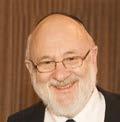
I was in a total fog during my first year in high school. I am convinced that my experience then was not unique. I entered a strange school, much larger than the one I had attended previously, and was not given the benefit of any orientation to the new environment. I did not know what to expect, and I was not informed about what was expected of me.
I struggled academically and socially. But I knew one thing, and that was that I liked to write, and I sought to learn how to do so. Toward the end of the year, I learned that there was a special track in the English department for those who were interested in writing. The track was called “Journalism for Sophomores” and was open to those who did well in their freshman English courses. But, as I said, I was in a fog that freshman year
and was merely passing freshman English. Nevertheless, I applied for entry into the journalism class. I was turned down. But I persisted and made it my business to arrange for an interview with Mr. Joe Brown, the instructor for the journalism class, and also the advisor for the student newspaper.
I will never forget Mr. Brown, because he was impressed by my perseverance and gave me a second chance explaining that many freshmen often become overwhelmed by the novelty of their new environment and don’t always excel to their full potential. He would allow me into the elite journalism class with the condition that I would prove myself by doing extra essays, and doing them well, during the first six weeks of the semester.
I fulfilled his conditions and spent not one, but three years in the special journalism section under his tutelage. I enjoyed it, learned a great deal, became one of the editors of the prize-winning student newspaper, and was elected editor-in-chief of the senior yearbook. To this day, every time I put a pencil to paper or fingers to a computer keyboard, I think of Joe Brown.
In this week’s Torah portion, Parshat Beha’alotecha, we read of a group of people who, like me, were unable to fulfill their responsibilities the first time around. In their case, it was the mitzvah of bringing the Passover offering on the 14th day of the month
The OU Israel Center wishes to thank our long time volunteer Erika Braun
for her many years of service with the Center. May she have an easy and successful future in her new location
of Nisan, which they failed to do. For them, it was not the strangeness of a new school that prevented them from doing the mitzvah properly. Rather it was because “...they were unclean, having come into contact with a dead body, so that they could not keep the Passover on that day.” (Numbers 9:6)

They could easily have taken the approach of shrugging their shoulders and saying something like, “We tried our best, but circumstances were such that we were unable to perform the Passover sacrifice. We have a good excuse, so let’s move on.”
But that was not their reaction. Instead, “... they came before Moses and before Aaron on that day.” They wanted, nay demanded, a second chance.
“Unclean though we are by reason of a corpse, why must we be debarred from presenting the Lord’s offering at its set time with the rest of the Israelites?” (Numbers 9:7) They persisted and insisted upon having the same benefits of the rest of the people, those who did not suffer the set of circumstances that denied this particular group of men this type of privilege.
Most fascinating is the fact that Moses did not know what to tell them. As far as I can tell, this is the first time in the Bible, and quite possibly the first time in the history of the human race, that a group of people asked for a second chance. Moses was unaware of a precedent for the privilege that this group was requesting.
So Moses, having the kind of access that none of us has today to the Divine, said to them, “Stand by, and let me hear what instructions the Lord gives about you.”
(Numbers 9:8)
The Lord gave them a second chance.
He told Moses that forevermore in the history of the Jewish people, when individuals are faced with circumstances that prevent them from bringing the Passover offering in its proper time, “they shall offer it in the second month...” God, in His infinite mercy, gave a second chance, a kind of a do-over session, to a group of people who could have easily given up, but who did not want to be left out and therefore persevered in their search for a spiritual privilege. There is so much to be learned from this story. Although we cannot play God, we can certainly emulate Him and give others a second chance. We need not strictly enforce all of our rules but can recognize that there are circumstances in the lives of men that prevent them from doing the right thing the first time around and who, therefore, require a little “slack.”
But the great lesson for me in the story is the value of perseverance, of not taking no for an answer but continuing to knock upon the doors of opportunity. These men who were “unclean because of their contact with a corpse” are among the heroes (in their case, unnamed heroes) of the entire biblical narrative. Had they not persevered, we would never have learned of the Almighty’s provision of a Pesach Sheni, an opportunity to compensate for the excusable failure to do it right the first time.
So I learned much from Mr. Joseph Brown about how an empathic teacher can bring out the best in a confused youngster. But I also learned, very early in my own life, about the value of persistence.
‘Tis a lesson you should heed, Try, try again.

If at first you don’t succeed, Try, try again.
I am tempted at this point to hold a contest and offer a prize to the reader who can identify the source of that famous quote. But I will forgo that temptation and tell you that it was first published in A Teacher’s Manual, by early 19th century educator Thomas H. Palmer.
Or in the words of another relative unknown, William Ward:
Four steps to achievement: plan purposefully, prepare prayerfully, proceed positively, pursue persistently.
Or, finally, in the words of the famous Goethe:
In the realm of ideas everything depends on enthusiasm; in the real world, all rests on perseverance.
THIS IS THE TIME TO MARKET YOUR PROPERTIES IN A REAL ESTATE OFFICE WITH EXCELLENT EXPOSURE!
FOR SALE
FOR SALE
FOR SALE
FOR SALE
FOR SALE
FOR SALE
FOR SALE
Short Term Rental available for the Summer/Rosh Hashana/ Yom Kippur/Sukkot

Luxury furnished
4 Bedroom
4.5-bathroom

Penthouse in the sky with unobstructed views. Large terrace of 100m plus an additional sukkah terrace that seats 28 people. Fully equipped with 2 ovens,3 sinks, 2 dishwashers, washer, dryer & much more. Building is secured with private parking included. Price for summer is $500 a night. Price for Holidays ranges from $700-$1000 a night. Excellent location.
1 minute walk from light rail and 8-minute walk from Gan Sacher.
Please call Ricki at 19546006333 or email Rickikaneti35@gmail.com
BRAND NEW APT, MISHKENOT HAUMA, JLM 3BR|108m²|4th floor|8m² balcony|parking|accessible NIS 4,750,000 - Tehila: 050-420-5333
RENOVATED APT, SPLIT INTO 2 UNITS, MACHANE YEHUDA, JLM 2 rooms|3rd floor|15+18m²|rented out for NIS 2700+2500 NIS 1,590,000 - Tehila: 050-420-5333
AMAZING COTTAGE, BET HAKEREM, JLM 4.5BR|179m² built|on 3 levels|180m² garden|renovated PRICE REDUCTION! NIS 7,950,000 - Tehila: 050-420-5333
HISTORICAL AUTHENTIC PRIVATE HOME, NACHLAOT, JLM Built 220.4m² |balconies+patio 47+34m² |lots of potential NIS 11,470,000 - Tehila: 050-420-5333
COZY & AIRY APT, MACHANE YEHUDA, JLM 2BR |4th floor |45m² built |4m² balcony NIS 1,910,000 - Mendel: 052-720-3497
SPECTACULAR PENTHOUSE, OLD KATAMON, JLM 4.5BR penthouse |140m²| roof terrace with view NIS 7,490,000 - Noa: 052-870-2387
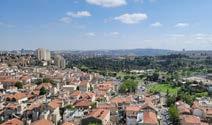
EXQUISITE PROPERTY, NACHLAOT, JLM 2BR | 65m²|balcony|parking|storage NIS 2,730,000 - Tehila: 050-420-5333
FOR SALE APT WITH GORGEOUS VIEW, HAR HOMA, JLM 3BR|81m²|2 bathrooms |Ground floor out of 5 PRICE REDUCTION! NIS 2,800,000 - Ouriel: 058-516-1356
FOR SALE
FOR SALE
FOR SALE
FOR SALE FOR SALE
FOR SALE
FOR SALE
EXCELLENT APT FOR INVESTMENT, FRENCH HILL, JLM 2BR | 7th floor out of 7 | 63m² | in process of Pinui Binui NIS 2,250,000 - Ouriel: 058-516-1356
AMAZING DUPLEX PENTHOUSE, EFRAT 4BR |168m² | large balconies |3 exposures
SPECIAL PRICE: NIS 3,750,000 - Noa: 052-870-2387
COTTAGE WITH TREMENDOUS POTENTIAL, EFRAT 6BR|190m²|on 4 levels|3 baths|sukkah balcony
NIS 3,690,000 - Noa: 052-870-2387
BEAUTIFUL SEMI-DETACHED HOME, EFRAT 5BR |3 stories |180m² built |160m² garden
NIS 4,500,000 - Noa: 052-870-2387
GORGEOUS SEMI-DETACHED HOME, EFRAT 8BR|5 full baths|400 m²|large garden|spectacular view NIS 7,500,000 - Noa: 052-870-2387
FABULOUS APT WITH CHARMING YARD, MITZPE YERICHO 6BR | 165m² built | 70m² garden|storage unit
NIS 3,285,000 - Mordechai: 052-720-3089
PRIVATE HOME WITH STUNNING VIEW, MITZPE YERICHO 5BR|4 baths|330m² built|500m² lot|sukkah balcony
NIS 4,300,000 - Mordechai: 052-720-3089
office@noamhomes.com

There have been times when one passage in this week’s parsha was, for me, little less than lifesaving. No leadership position is easy. Leading Jews is harder still. And spiritual leadership can be the hardest of them all. Leaders have a public face that is usually calm, upbeat, optimistic, and relaxed. But behind the façade we can all experience storms of emotion as we realise how deep are the divisions between people, how intractable are the problems we face, and how thin the ice on which we stand. Perhaps we all experience such moments at some point in our lives, when we know where we are and where we want to be, but simply cannot see a route from here to there. That is the prelude to despair.
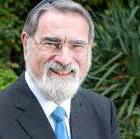
Whenever I felt that way, I would turn to the searing moment in our parsha when Moses reached his lowest ebb. The precipitating cause was seemingly slight. The
people were engaged in their favourite activity: complaining about the food. With self-deceptive nostalgia, they spoke about the fish they ate in Egypt, and the cucumbers, melons, leeks, onions, and garlic. Gone is their memory of slavery. All they can recall is the cuisine. At this, understandably, God was very angry (Num. 11:10). But Moses was more than angry. He suffered a complete emotional breakdown. He said this to God:
“Why have You brought this evil on Your servant? Why have I failed to find favour in Your eyes, that You have placed the burden of this whole people on me? Did I conceive this whole people? Did I give birth to it, that You should say to me, ‘Carry it in your lap as a nurse carries a baby?’ … Where can I find meat to give to this whole people when they cry to me saying, ‘Give us meat to eat?’
I cannot carry this whole people on my own. It is too heavy for me. If this is what You are doing to me, then, if I have found favour in Your eyes, kill me now, and let me not look upon this my evil.” (Num. 11:11-15)
This, for me, is the benchmark of despair. Whenever I felt unable to carry on, I would read this passage and think, “If I haven’t yet reached this point, I’m okay.” Somehow the knowledge that the greatest Jewish leader of all time had experienced this depth of
darkness was empowering. It said that the feeling of failure does not necessarily mean that you have failed. All it means is that you have not yet succeeded. Still less does it mean that you are a failure. To the contrary, failure comes to those who take risks; and the willingness to take risks is absolutely necessary if you seek, in however small a way, to change the world for the better.
What is striking about Tanach is the way it documents these dark nights of the soul in the lives of some of the greatest heroes of the spirit. Moses was not the only prophet to pray to die. Three others did so: Elijah (1 Kings 19:4), Jeremiah (Jer. 20:7-18) and Jonah (Jon. 4:3).1
The Psalms, especially those attributed to King David, are shot through with moments of despair:
“My God, my God, why have You forsaken me?” (Ps. 22:2)
“From the depths I cry to You.” (Ps. 130:1)
“I am a helpless man abandoned among the dead … You have laid me in the lowest pit, in the dark, in the depths.” (Ps. 88:5-7)
What Tanach telling us in these stories is profoundly liberating. Judaism is not a recipe for blandness or bliss. It is not a guarantee that you will be spared heartache and pain. It is not what the Stoics sought, apatheia, a life undisturbed by passion. Nor is it a path to nirvana, stilling the fires of feeling
1 So, of course, did Job, but Job was not a Prophet, nor - according to many commentators - was he even Jewish. The book of Job is about another subject altogether, namely: Why do bad things happen to good people? That is a question about God, not about humanity.
Jerusalem Real Estate is My Business

Eta: 054-723-3863 Rachel: 052-546-6425
Amazing stand alone homes in OLD KATAMON, TALBIYA, BAKA, GERMAN COLONY
OLD KATAMON 80 sqm with 2 bedrooms and 2 bathrooms, one flight up with elevator. Completely renovated with terrace that opens into a sukka. Full of light & surrounded by greenery. Very quiet Price 4,200,000 NIS
Fantastic opportunity to buy 170 sqm on one floor, with sukka terrace, Shabbat elevator, brand new apt ready in 2 years. Only 6,500,000 NIS.
In GERMAN COLONY, 140 sqm on one floor, 2nd floor walk up, completely renovated with 4 bedrooms and 2 full bathrooms. Large sukka terrace.
7,100,000 NIS
In BAKA, most sought out location. New apartment duplex of 236 sqm plus 81 sqm of outdoor space. Plus parking. For more info call Eta: 0547233863

Fantastic garden apartment for sale on Lupo Street. ARNONA

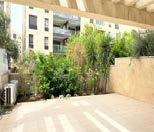
175 sqm 6 rooms 4 bedrooms and 3.5 bathrooms. 60 sqm garden.


Security room / pantry. Central air / underfloor heating. Extra office downstairs. One large parking spot. Storage room
8,900,000 NIS
Eta Morris Realty, Ltd.

etamorrisrealestate@gmail.com
Eta: 054-723-3863 · Rachel: 052-546-6425
etamorrisrealty.co.il
by extinguishing the self. These things have a spiritual beauty of their own, and their counterparts can be found in the more mystical strands of Judaism. But they are not the world of the heroes and heroines of Tanach.
Why so? Because Judaism is a faith for those who seek to change the world. That is unusual in the history of faith. Most religions are about accepting the world the way it is. Judaism is a protest against the world that is in the name of the world that ought to be. To be a Jew is to seek to make a difference, to change lives for the better, to heal some of the scars of our fractured world. But people don’t like change. That’s why Moses, David, Elijah, and Jeremiah found life so hard.
We can say precisely what brought Moses to despair. He had faced a similar challenge
before. Back in the book of Exodus the people had made the same complaint:
“If only we had died by the hand of the Lord in the land of Egypt, when we sat by the fleshpots and ate bread to the full, for you have brought us out into this desert to starve this whole assembly to death.” (Ex. 16:3)
Moses, on that occasion, experienced no crisis. The people were hungry and needed food. That was a legitimate request.
Since then, though, they had experienced the twin peaks of the revelation at Mount Sinai and the construction of the Tabernacle. They had come closer to God than any nation had ever done before. Nor were they starving. Their complaint was not that they had no food. They had the manna. Their complaint was that it was boring: “Now we have lost our appetite (literally, “our soul is dried up”); we never see anything but this manna!” (Num. 11:6). They had reached the spiritual heights but they remained the same recalcitrant, ungrateful, small-minded people they had been before.2
That was what made Moses feel that his entire mission had failed and would continue to fail. His mission was to help the Israelites create a society that would be the opposite of Egypt, that would liberate instead of oppress; dignify not enslave. But the people had not changed. Worse: they had taken refuge in the most absurd nostalgia for the Egypt they had left: memories of fish, cucumbers, garlic and the rest. Moses had discovered it
2 Note that the text attributes the complaint to the asafsuf, the rabble, the riffraff, which some commentators take to mean the “mixed multitude” who joined the Israelites on the Exodus.

was easier to take the Israelites out of Egypt than to take Egypt out of the Israelites. If the people had not changed by now, it was a reasonable assumption that they never would. Moses was staring at his own defeat. There was no point in carrying on.
God then comforted him. First, He told him to gather seventy elders to share with him the burdens of leadership. Then He told him not to worry about the food. The people would soon have meat in plenty. It came in the form of a huge avalanche of quails.
What is most striking about this story is that thereafter Moses appears to be a changed man. Told by Joshua that there might be a challenge to his leadership, he replies: “Are you jealous on my behalf? Would that all the Lord’s people were prophets, that the Lord would put His spirit on them” (Num. 11:29). In the next chapter, when his own brother and sister begin to criticise him, he reacts with total calm. When God punishes Miriam, Moses prays on her behalf. It is specifically at this point in the long biblical account of Moses’ life that the Torah says, “The man Moses was very humble, more so than any other man on earth” (Num. 12:3).
The Torah is giving us a remarkable account of the psychodynamics of emotional crisis. The first thing it is telling us is that it is important, in the midst of despair, not to be alone. God performs the role of comforter. It is He who lifts Moses from the pit of despair. He speaks directly to Moses’ concerns. He tells him he will not have to lead alone in the future. There will be others to help him. Then He tells him not to be anxious about the people’s complaint. They would soon have so much meat that it would make them
Pinsker building - 4 rooms, fully renovated. Electrical appliances, closets, Succa, parking, Shabbat elevator, immediate Rechavia Wolfson towers4 rooms, 100m, renovated, high floor 5 rooms, 136m, renovated, high floor
San simon - New 7 room duplex penthouse of 300m, Succa balcony, Shabbat elevator, parking, machsan
Katamon - Near shteiblach, 4 room apt., 1st floor, well kept, bright, 3 exposures, parking
Gdud Haivri - 4 rooms, for renovation, 3 exposures, 9 steps to apt., car park, immediate
052-2639702
THIS WEEK: Single mother on welfare with a sick child needs a new fridge.
• Checks: Make out to “Yesh Ezra” Send to: Yesh Ezra, POB 31476, Romema, Jerusalem, 9136101
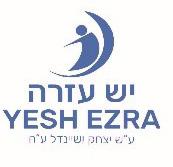
• Bank Transfer: Bank Mercantile (17), Branch 642, A/C 79747843, Yesh Ezra To obtain your tax benefit receipt, send details by Whatsapp/email.
• Credit card: Sara at 077-820-0196
Sunday, Monday, and Wednesday (10:15am - 2:45pm)
• Website: www.yeshezra.org Click on “Donate Now”
Inquiries: Menachem Persoff 050-570-1067
menpmp@gmail.com

ill, and they would not complain about the food again.
The essential principle here is what the Sages meant when they said, “A prisoner cannot release himself from prison.”
(Brachot 5b) It needs someone else to lift you from depression. That is why Judaism is so insistent on not leaving people alone at times of maximum vulnerability. Hence the principles of visiting the sick, comforting mourners, including the lonely (“the stranger, the orphan and the widow”) in festive celebrations, and offering hospitality – an act said to be “greater than receiving the Shechinah.” Precisely because depression isolates you from others, remaining alone intensifies the despair. What the seventy elders actually did to help Moses is unclear. But simply being there with him was part of the cure.
077-2050015
052-2678749
golanechasim@gmail.com
RASCO: new 4 room apartment, 95m, master suite, elevator, balcony, very nice view 2,950,000 NIS
3 exp Shabbat elevator, parking, 3,290,000 NIS

Old Katamon: Spacious 3-room apartment in a very quiet street, 75 sqm, sukkah balcony facing a green and pastoral view, 3 exp. Shabbat elevator, private parking, storeroom, 2,690,000 NIS
ARNONA: 4-room apartment, 90m, beautifully renovated, master suite, balcony, storage, Shabbat elevator, private parking 3,250,000 NIS
BAKA: New 4 room apartment in a new building, 88m, master suite, storage, Shabbat elevator, private parking, 3,950,000 NIS
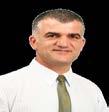
RECHAVIA: 4-room apartment, 92m, Suka balcony, Shabbat elevator, fully accessible, private parking, storage 4,400,000 NIS
ARNONA: 5-room apartment, 120m, balcony, elevator, fully accessible, private parking, storage 4,350,000 NIS
BAKA: 5-room garden apartment, 140m, master suite private parking, storage, full of light, nice garden, 6,000,000 NIS
OLD KATAMON: Spacious new 5-room apartment, 140m, terrace, underfloor heating, Shabbat elevator, 2 parking, 6,300,000 NIS
FOR RENT:BAKA: nice 4-room apartment, 82m, beautifully renovated, master suite, air conditioners, balcony, second floor, elevator - fully accessible, storage, 8,000 NIS
The other thing it is telling us is that surviving despair is a character-transforming experience. It is when your self-esteem is ground to dust that you suddenly realise that life is not about you. It is about others, and ideals, and a sense of mission or vocation. What matters is the cause, not the person. That is what true humility is about. As the wise saying goes, popularly attributed to C. S. Lewis: Humility is not about thinking less of yourself. It is about thinking of yourself less.
When you have arrived at this point, even if you have done so through the most bruising experiences, you become stronger than you ever believed possible. You have learned not to put your self-image on the line. You have learned not to think in terms of self-image at all. That is what Rabbi Yochanan meant when he said, “Greatness is humility.”3 Greatness is a life turned outward, so that other people’s suffering matters to you more than your own. The mark of greatness is the combination of strength and gentleness that is among the most healing forces in human life.
Moses believed he was a failure. That is worth remembering every time we think we are failures. His journey from despair to self-effacing strength is one of the great psychological narratives in the Torah, a timeless tutorial in hope.
These weekly teachings from Rabbi Sacks zt”l are part of his ‘Covenant & Conversation’ series on the weekly Torah teaching. With thanks to the Schimmel Family for their generous sponsorship, dedicated in loving memory of Harry (Chaim) Schimmel. Visit www.RabbiSacks.org for more.



This week’s haftarah, a selection taken from Sefer Zecharya, is the most consistently read of all the haftarot. Although those selections read on the Shabbatot of Rosh Chodesh or of Erev Rosh Chodesh may be read multiple times each year, they often are replaced by readings of the special Shabbatot, such as those of Shekalim, HaChodesh, Chanukah and the Three Weeks (before Tish’a B’Av). The result, therefore. is that, although they might be read three times a year (7% of the time) they are generally read (93%) only once or twice annually. Our haftarah, however, is ALWAYS read on Shabbat Chanukah and on Parashat Beha'alotcha – always twice each and every year.
And yet, despite its regular reading, it is a reading difficult to fully understand. In fact, Rashi opens his commentary to the sefer with the words: “[This Book] is very unclear (“stuma”) as it contains dream-like visions that are difficult to interpret…” Well, if it is difficult for Rashi – how much more so for us. The first six of the fourteen p’rakim of Sefer Zecharya contain eight visions, two of them included in our haftarah (from Chapters 3 and 4). We will focus on the last vision- the one on the Menorah, as it is the connection
to the opening topic of our parasha and to the holiday of Chanukah.
Our parasha begins with the mitzvah of Aharon, the Kohen Gadol, to kindle the golden Menorah in the Mishkan/Mikdash
Rashi quotes the Midrash that this mitzvah was meant as a comfort to Aharon, who was not included in the inaugural korbanot of the tribal leaders. Hashem reassured Aharon that his task of lighting the Menorah twice a day was a greater meritorious act than the korbanot offered by the nesi’im. The Ramban clarifies the Midrashic approach suggesting that it referred to the future lighting of the Menorah by Aharon’s descendants, the Chashmona’im, during their Chanukat Habayit in the Second Temple era.
HaRav Baruch Gigi of Yeshivat Har Etzion, troubled by the Ramban’s comment that “the lights will always illuminate the Menorah'' suggests that this does not refer to the menorah of the Beit HaMikdash (which, ultimately, would be destroyed), but, rather, the menorah lit by all Jews on Chanukah, the
Do you have a life insurance policy you:
• No longer want?
• No longer need?

• Can no longer afford the premium?
• Could you use extra money instead of keeping your policy?
I can guarantee that if you qualify with the underwriting process I can get you more money than if you cash it in with the company.
Please contact Moshe Russell at: Buymypolicy32@gmail.com
Chanukiya menorah kindled in all homes, marking the miracle Hashem brought for the Kohanim/Chashmona’im. And Rav Gigi continues, saying that just as the Menorah’s light was not meant to illuminate the inner sanctuary but to brighten all who were outside of it (See Shabbat 22b), so too this chanukiya lights up the home and, by doing that, makes every home into a “mikdash m’at” – a miniature sanctuary.
When applying this approach to Zecharya’s vision, we may better understand his revelation from Hashem. Zecharya lived in the beginning of the second temple era. Although it was a time of great anticipation for a rebuilt Beit HaMikdash, a renewal of the sacrificial rite and the hope for a restoration of the Davidic dynasty it was also an era of challenge, fear and doubt. It was at this particular time, therefore, that Hashem relayed to His prophet an essential message: that the light of the future will not be emanating from the Menorah in the Temple but through the small Chanukiya surrounded by all the family members. The glow of religious fervor must be first kindled at home before it could hope to spread into the Temple.
The hope for a shining future must find its source in the home.
Ramat Beit Shemesh Gimmel 1
Duplex
6 rooms in a perfect location!

Renovated to the highest possible standard. Cross ventilation from three sides
Amazing view from every side
Adjacent storage room
Nothing else needs to be said!
Ramat Beit Shemesh Gimmel 1
Built on a hillside facing a beautiful panoramic view is a stunning, spacious, airy vila of 378 sqm

Very serious sellers!
Neve Shamir
A spacious penthouse, which is about 140 square meters + balcony which is 32 square meters
Amazing view!
5 rooms, 8th floor
Upgraded kitchen + kitchen island
Mini central air conditioner
Covered parking and storage room
Rivky: 050-969-3233
In Parshat Beha'alotcha we encounter the mitonenim (םיננואתמ), people who complain that they are unsatisfied with the mann and long for the delicacies they ate in Egypt. It seems unlikely that slaves would have been treated to such elegant meals, yet they express their desire to partake at least in certain staples, like fish, melon, onions and garlic.
The Torah tells us that “Moshe heard the people weeping with their families - עַמְׁשִּיַו
םָעָה־תֶא ה ֶׁשמ (Bamidbar 11:10). Rashi offers two interpretations to this pasuk. First Rashi suggests that they gathered as families to weep together. Then Rashi states that the reference to “families” suggests that they wept because of the arayot restrictions prohibiting relations with family members.
This is not the only time that the Torah ascribes a relatively benign motive for someone’s deeds and Chazal teaches us that the person’s intentions were actually
abominable. When Lot separates from Avraham, the Torah tells us that Lot selected Sedom for its fertile land. Chazal reveal however, that Lot wanted to be near the hotbed of immorality in Sedom. Why did Chazal choose to present Lot as a wicked person when the Torah depicts him as an innocent person seeking to provide for his cattle?
Similarly, in Parshat Shelach, when the spies return from Israel, the Torah states only that their report was not favorable. The Zohar, cited by many commentaries, reveals that the spies were motivated by self-interest. They feared when they entered Eretz Yisrael they may lose their status of leadership, so they bad-mouthed the country to preserve their own honor. Why do Chazal depict the spies as selfish and power-hungry rather than as misguided individuals?
Rav Yaakov Kamenetsky offers a fascinating insight. By revealing the true
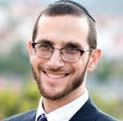
Sarah & David Maslow and family on the engagement of their granddaughter
underpinnings of the protagonists in these stories Chazal are informing us that every human has subconscious emotions and desires that cause them to make dreadful decisions. The Torah records what people in these incidents claimed their motivations were, much as we would claim that our behavior is guided only by the purest of intentions. Chazal wanted to teach us that we too can be blind to the forces beneath the surface of our minds that direct us towards the wrong direction.
In this week’s parsha, Chazal were not satisfied with the simple reading of the text. It could not be that the families gathered and wept because they missed the taste of opinions and garlic. The reference to “family” must be to highlight something deeper- they wept because they were bothered by the Torah’s restriction on relations with their

family members.


How can one protect himself from the blind spots that can cause one to misread his true motivation? In Pirke Avot we are taught רבח ךל הנקו ,בר ךל השע – make for yourself a Rabbi and acquire for yourself a friend (Avot 1:6). We ought to surround ourselves with role models and wise people that we respect who are not afraid to tell it to us like it is – when necessary. Without mentors and friends who can guide us honestly, it is difficult to function properly.
May we internalize this lesson and ensure that when we make important decisions, we take a step back and evaluate, together with someone we respect, our true motivation, to ensure that we take the proper action.

Our parashah begins with the command to Aharon to light the holy menorah in the mikdash. It is most fascinating that the Torah tells us, “Vaya’as ken Aharon,” (Bamidbar 8;3), that Aharon did as he was instructed. Rash teaches that the Torah’s statement is there to highlight the commendable nature of Aharon’s act - he did not deviate from what he was told. What is the Torah trying to teach us with this comment, and why would we think that Aharon may deviate from his given task?
Rav Rivlin in his Sefer Haparshiyot gives us a deeper perspective of the Menorah and what lighting it achieved. If we look at the story of creation, we find that the Torah states “vayehi ken – and it was so” after each day’s element was formed, except after day one, the day when the light was created. Chazal explain that the original light of creation, known as the “ohr haganuz,” was hidden for the tzadikim in the future. This light, therefore, was not fully manifested at that time, it was not “ken.” However, there were certain times and places that this hidden light came to the fore. When Aharon HaKohen lit the Menorah, he drew out this hidden light into this world, “vay’as ken,” the light was substantiated at that point. Why was it Aharon Hakohen specifically who was worthy of restoring this light to the world? Chazal describe the ohr haganuz as having the power to reveal the entirety
of creation from one end of the world to the other. Metaphorically, this is the capacity to see beyond the physical and recognize Hashem’s Presence in every aspect and detail of creation. Aharon Hakohen, with his pristine midot and utmost humility, demonstrated the ability to see beyond himself and perceive the Divine Presence as the only reality.
Human nature drives us to want to express our uniqueness and special qualities, to do things that make us stand out and be recognized. The greatness of Aharon, says Rav Ezrachi in Bircat Mordechai, was that he lit the Menorah with the same mindset, the same humility and focus to do Hashem’s Will daily. This is the deeper meaning of Rashi, “shelo shina.” Aharon never deviated from doing what Hashem asked of him, he never analyzed or speculated. He never examined or searched for alternative practices in his avodah.
Rav Goldstein highlights a beautiful lesson in Sha’arei Chayim. Aharon lit the Menorah every single day for over 38 years. Doing the same mitzvah repeatedly often leads us to operate in a robotic fashion. Aharon’s greatness was that his passion never waned. He performed his mitzvah the one hundredth time with the same fire and enthusiasm that he exhibited the very first time he lit the Menorah. What a message for us! As we go about our tasks and obligations throughout our day, we can keep this in mind infusing the familiar mitzvot we do with excitement and spirit.





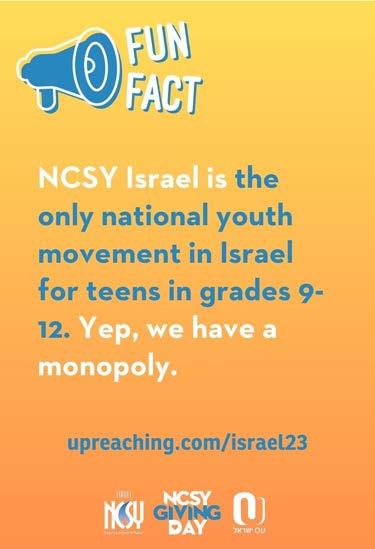

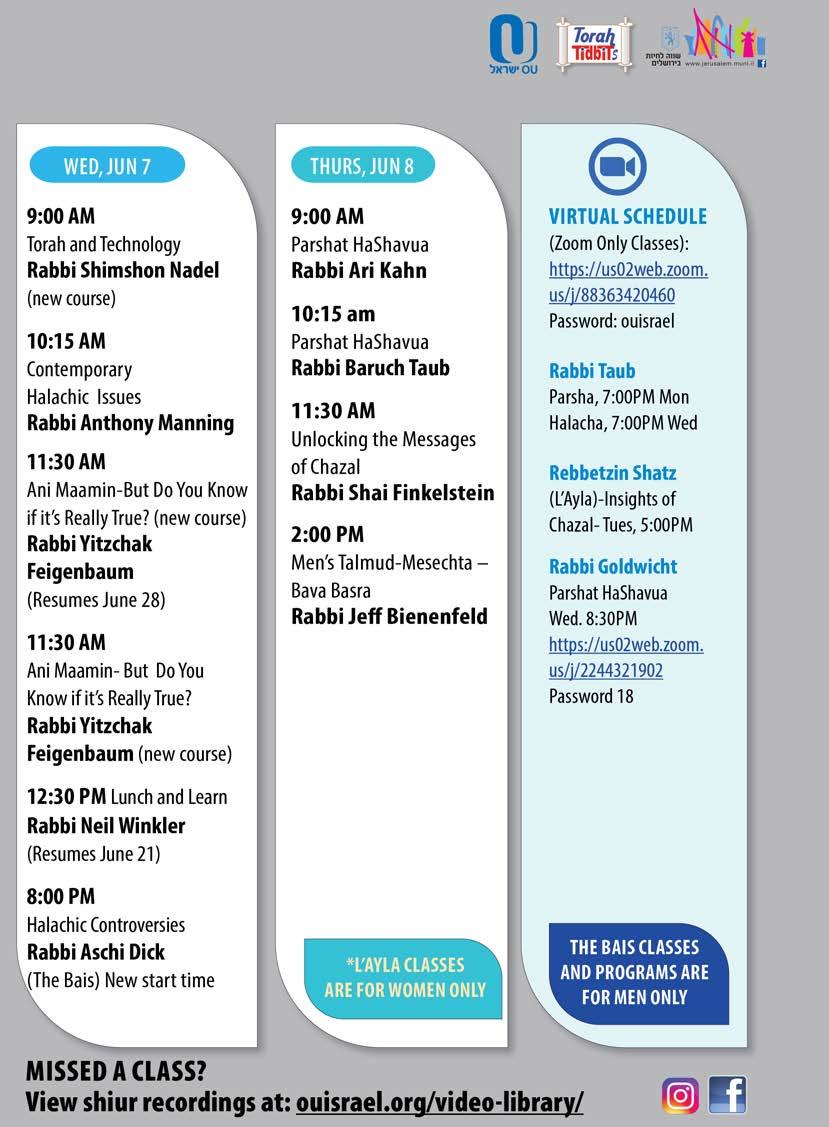

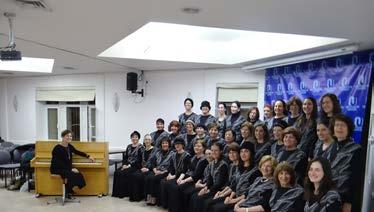





















































































Tuesday, May 16th - all morning shiurim were sponsored by Mindy & Seymour Liebman for a Refuah Shleima for Shifra bat Miriam and Chaya Leah bat Sara
Sunday, May 28th - all morning shiurim were sponsored by Estelle Harris in memory of her dear husband, Richard M. Harris, Refael Meir ben Zvi Hirsch Halevi z”l, on his 11th yartzeit, 2 Sivan
Sunday, May 28th - Rabbi Dr. Aaron Adler’s shiur was sponsored by Rosina Fisher for an aliyah of the neshamot of her husband Mordechai Avigdor ben Peretz z”l and her parents Chia Esther bat Yerachmiel Yissachar haCohen a”h and Yitzchak ben Yehuda z”l - may their memories be for a blessing
Monday, May 29th - Rabbi Goldscheider’s shiur is sponsored in memory of ל’ז והילא ןב דוד תמשנ יוליעל Yahrzeit is 9 Sivan (May 29, 2023) by Shlomo Fink
Rabbi Goldscheider’s shiur has been sponsored for the 2023 Academic Year
המלש ןב בוט םשו ה’’ע םהרבא תב םירמ תמשנ וליעל
Rebbetzin Shira Smiles shiur is sponsored for the 2023 academic year by Dr. & Mrs. Menachem Marcus in memory of their parents, Rose & Dr. Emanuel Marcus z”l -
ל”ז סוקרמ השמ ןב יכדרמו ריאמ ףסוי תב לזייר Rosi and Ernest Strauss z”l -
ל”ז סוארטש דוד ןב לאינדו םהרבא תב דומיל
Rabbi Breitowitz’s Tuesday Shiur - Minchat Chinuch is sponsored for the academic year 2023 by Rabbi Refoel & Sharon Auman in memory of their parents Edith & Reiner Auman z”l
ד”יה לאפר תב ה”ע רתסאו ל”ז קודצ ןב הנוי and their son Rabbi Shmuel Eliyahu Auman z”l
י”נ לאפר ברה ןב ל”ז והילא לאומש ברה
Rabbi Goldin’s shiur is sponsored for the 2023 academic year by Dr. & Mrs. Menachem Marcus in memory of beloved aunts
Irma Haas a”h and Hilde Myer a”h
Rabbi Manning’s shiur has been sponsored for the 2023 academic year
ל’’ז ןמלק ןב גילזו ה’’ע תידנרב תב הנרב תמשנ יוליעל Rabbi Taub’s weekly Thursday Parshat HaShavua Shiur is sponsored by The Jewish Legacy Foundation
•Yosef Ezriel ben Chaya Michal הלחמ ןב ןתנוהי
• Esther Fruma bat Baila
• Yisrael Leib ben Chana
• Chana Bat Bruriah
• Chaim Moshe Ben Leah
Walking down King George St. in Jerusalem and want a cold bottle of water?
Come help yourself to a bottle at 52 King George.
In loving memory of Yoni’s wife
Tziporah a"h, a true Eishes Chayil, always full of chessed, kindness and laughter, and brought life and strength to so many people, that she touched! She was like Aron, who loved peace and pursued peace.

Yoni thanks Hashem for having the opportunity of having Tziporah in his life, to learn of her caring, patience and happiness, to overcome her challenges. May Tziporah's Neshama be a light onto the world, in a time of darkness, and may her Neshama shine to Gan Eden. Yoni misses Tziporah with tears in his eyes, as Hashem gave him a gift, a crown jewel, now he returns her to Hashem. With thanks and Toda. Love, Yoni
To help refill the supplysend tax deductible donations for Be’er Tziporah a"h Bottled Water Gemach to Chabad of RechaviaRabbi Yisroel Goldberg email Rabbi@JerusalemChabad.org 02 800-1717

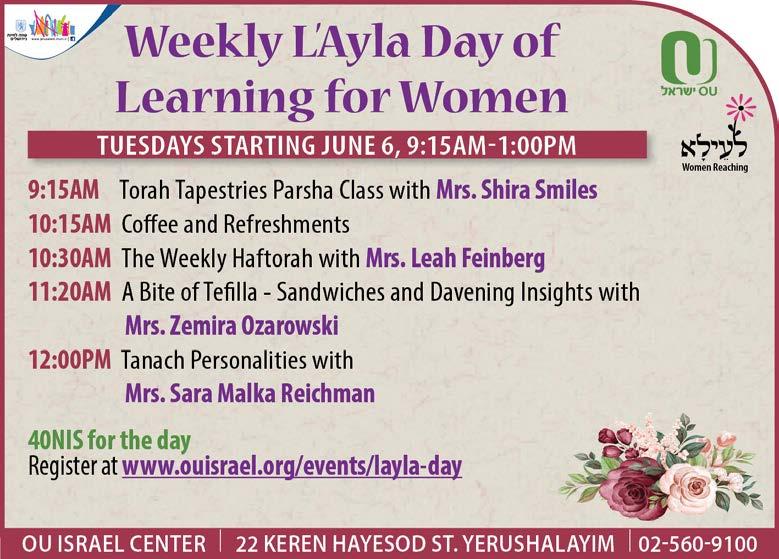

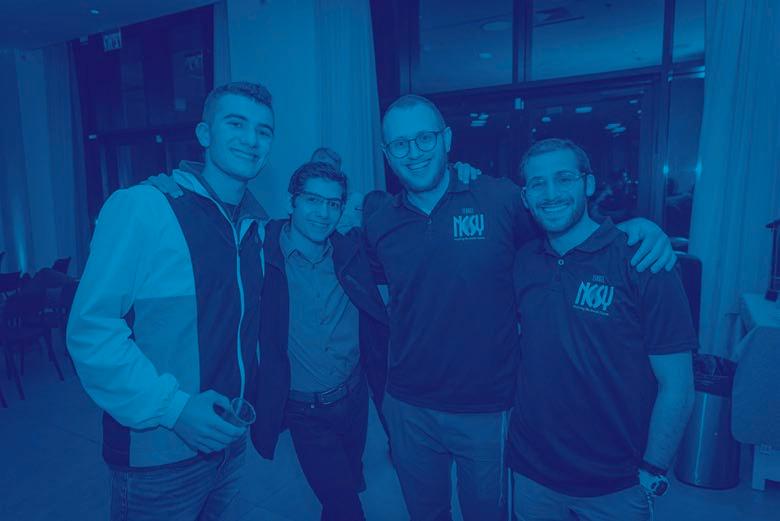
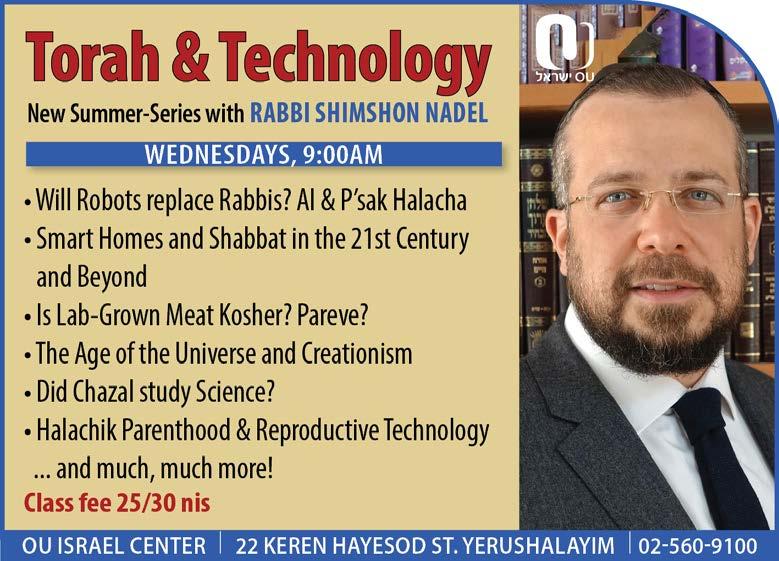
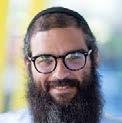
Chacham Yosef Chaim of Baghdad was the great posek, Kabbalist and community leader of Sefardic Jewry at the turn of the 19th Century. He wrote extensively and is known by the title of his most popular work, Ben Ish Chai, an exposition of the laws of everyday Jewish life interspersed with minhagim, musar and mystical insights, all arranged by order of the weekly parshiyos.
An ascetic who fasted regularly to remove distraction and weaken his physical desires, the Ben Ish Chai was known for his unwavering dedication to personal and communal kedushah. He would also rise each night to recite Tikun Chatzos, lamenting the destruction of the Beis haMikdash, after which he continued learning until Shacharit prayers at sunrise. In all, he was widely respected as a great chacham and tzadik of the generation.
Once, the son of a prominent family in Baghdad had left home and abandoned mitzvah observance. All the ‘interventions’, pleading and threats were to no avail. On the verge of conversion and intermarriage, the man’s family finally begged for an opportunity to meet with the elder Chacham of Bagdad.
The Ben Ish Chai agreed to the meeting and set the time for Shabbos morning following davening. “But let’s not meet at the Beit Knesset; perhaps you’ll be more comfortable at my home.” The young man arrived at the set
time, the elderly tzadik welcomed him, made Kiddush for him and served him a heaping, steaming portion of hamin (cholent). As the aroma of meat, rice and beans, spiced to perfection and cooked overnight, tantalized his senses, the Chacham asked, “Would you like to taste the haminados as well?” Haminados is a Sefardic dish of eggs browned in the hamin which have absorbed all the flavors of the stew, as well as the exquisite light of Layl Shabbos. “Thank you! Of course, it’s the tastiest part of the hamin.” As the young man, alienated from Yahadut, sat relishing the feast, the Ben Ish Chai looked into the man’s eyes and asked, “My son, if you go through with this, you will not have a Jewish wife, nor a Jewish home. How will you be able to go through life without ever enjoying haminados again?!”
(Based on Sefer Ben Yehoyada, Maseches Shabbos, 119)
Rebbe Yehudah haNasi once hosted the future Emperor of Rome, Antoninus, at a Shabbos meal. As, according to the halacha he could not cook new food on Shabbos, Rebbe Yehudah served him cold foods. At a later date, he prepared a more lavish feast on a weekday, in which he served Antoninus a more extensive menu, with freshly cooked, hot food. “Hey,” the Emperor frowned with surprise, “this food is not as good as the first meal; you omitted something!” Rebbi understood: “Indeed, there is one spice we omitted, but it’s not something the Emperor has at
home….” “Really?” grunted Antoninus, “is it possible that the Emperor’s kitchen is lacking any particular spice?”

Rebbe Yehudah responded:

“The missing ingredient is Shabbos. Do you have Shabbos?”
(Midrash Bereshis Rabbah, 11).
We all know this to be true; no matter how carefully one follows the recipe, mid-week cholent or challah is just not the same.
Our sedra recounts the strange fixation we had on seemingly inane menu items Jews had enjoyed ‘on the house’ in the ‘good old days’, when we were slaves in Mitzrayim:
“We remember the fish that we used to eat for free in Egypt… Oy, the cucumbers,
the melons, the leeks, the onions, the garlic!”
(Bamidbar, 11:5)Considering the immense suffering, slavery and exile we experienced in Mitzrayim, it is hard to understand this sudden wave of nostalgia. The irony may seem laughable — or tearfully tragic. The deepest form of exile is taking comfort in the ‘stability’ of incarceration and slavery. Even while we had been miraculously redeemed, and then wined and dined with mannah that fell from Heaven and tasted like anything we wanted, we were gripped by a sort of ‘Stockholm syndrome’. We yearned for the cuisine we had known for so long as hostages.
Yet, the Gemara explains that םָּנִח, “free”, means we considered ourselves ‘free’ of any obligation to be thankful to the Source of the food. Under the unimaginable pressure of slavery we felt free from having to consider the benevolence of the Giver of Sustenance. We were paradoxically “free” from commitment. When we were no longer in bondage and under external oppression, we had entered a new stage of our development. We were suddenly responsible to thank Hashem, to keep Mitzvos, and to have a grown up, committed relationship with the Ribbono shel Olam. The food we ate then represented much more than

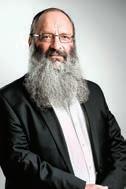
just a meal. It was now laden with our story, our identity as a nation, and our mutual commitment and connection with our Sustainer.
‘Food is great…in that it brings people near….’ (Sanhedrin, 13b)
Whether it is the sweetness of the charoses, the crispiness of Chanukah latkes, the particular aroma of hamantaschen coming out of the oven, or the haminados brewed in the cholent, our traditional foods mysteriously bring us close to a sense of home and connection to our family, ancestors and religious engagement. Much of the avodah of our lifecycle events is awakened just by tasting the unique foods we are commanded to eat or accustomed to serve.
Aromas and tastes create a primal, direct link to the collective cultural and spiritual memory bank of Klal Yisrael. They can help bring us near — not only to family, community and tradition, but to faith in HaKadosh Baruch Hu itself. In this way, the ‘special sauce’ and not-so-secret ingredient key to our nation’s spiritual sustenance is always to serve up Yiddishkeit with warmth and sweetness, abundantly spiced with love and simchah:
“Taste and see how good Hashem is!”
(Tehillim, 34:9)








Numerous prohibitions exist regarding foods produced by non-Jews. The Mishna (Avodah Zara 35:b) mentions several such foods, including oil, bread, milk and cooked foods, with the Gemara expounding different reasons behind these rabbinic decrees. We will focus on the rationale for the prohibition of eating foods cooked by a non-Jew, which our Sages call bishul akum. It should be noted that this decree only relates to kosher food cooked in kosher utensils; anything not kosher would result in other rabbinic transgressions.
There is a dispute among the authorities regarding the reason behind this decree. Most early authorities, including Rambam (Ma’achalot Asurot 17:9), Tosafot (Avodah Zara 38:a) and Ritva (Avodah Zara 37:a) rule that the reason is to discourage intermarriage; prohibiting kosher food cooked by a non-Jew is intended to create an emotional distance so that families will not marry into each other. However, Rashbam and Ohr Zarua (Avodah Zara 191) maintain that the Sages’ main concern in making the decree was lest the non-Jew mix non-kosher food into the kosher in order to cause the Jew to
transgress. Rashi cites the concern of intermarriage when commenting on the Mishna, yet later in the Gemara he mentions the reason of the risk of non-kosher food. Rashi’s opinion seems the most perplexing; why would our Sages need two reasons for the decree of bishul akum? Many answers are given by later authorities to resolve the contradiction in Rashi. Aruch Hashulchan (YD 113:2) explains that while the main reason behind the decree is to discourage intermarriage, Rashi’s second reason makes the prohibition of bishul akum even more severe than the other decrees in the Mishna. This explains why in certain circumstances (as will be explained in future articles), bishul akum is more severe than, for example, bread baked by a non-Jew.
There are a number of practical differences between the two reasons behind bishul akum. For example, according to the view of Rashbam that the non-Jew is suspected of mixing in non-kosher food, a mashgiach present would neutralize that concern. Accordingly, no actual participation by a Jew would be necessary in order to remove the prohibition of bishul akum. Another example would be where no non-kosher food is present, such as a particular non-Jewish restaurant or household that is known to not have any non-kosher food. According to the reason of intermarriage,
food cooked there by a non-Jew would still be prohibited because of bishul akum, while according to Rashbam and Ohr Zarua it would be permitted.
Most authorities rule that the primary reason for bishul akum is the concern of intermarriage, and that the risk of non-kosher food is either a side point or not the actual reason behind the decree. Shulchan Aruch (YD 112:1) mentions only the issue of intermarriage, even though in his previous Beit Yosef he also cites Rashbam’s logic. Because Shulchan Aruch only mentions the concern of intermarriage, many later authorities rule that this is the essential reason behind the decree of bishul akum (see Bein Yisrael Le’amim 5:2). It should be noted that there is a great misconception among some religious Jews that it is permitted to eat at a completely vegan restaurant even though non-Jews cook the food. This is a grave mistake, beyond the fact that there might be products that are not kosher even in a vegan restaurant. There is still the issue of bishul akum, especially in light of the ruling that the main reason is intermarriage.
In summary:
• Two reasons are given for the decree of bishul akum: the risk of intermarriage
GET FIT WHILE YOU SIT:
Exercise for ladies Sundays 12:45-1:30pm at the OU Israel Center Sura Faecher 0504153239
and the concern that a non-Jew might mix in non-kosher food.
• Since the main reason is intermarriage, having a mashgiach watch the non-Jew cook is not sufficient.
• Eating in a vegan, non-certified restaurant is completely prohibited since there is certainly bishul akum among other halachic issues.

Rechavia - Keren Hayesod St., 3-bedroom unfurnished apt. available for rent starting immediately, 2nd floor, dining area, good condition, 2 bathrooms, 1 shower, balconies, excellent location, near public transportation
Asking: 8500nis/month
CALL: 052 2604394
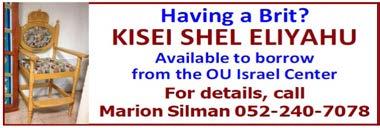

Our Sedra this week is Parshat Behaalotcha. Hashem instructs Moshe to speak to his brother Ahron, and tell him Behaalotcha et haNeirot.
Rashi offers three possible interpretations to the meaning of these words- behaalotcha et HaNeirot. The second interpretation suggested by Rashi- that you cause the flame to be elevated,to rise above the oil which was kindled. By kindling the oil, Ahron will cause lights to rise up and shine in the Beit HaMikdash.
Rabbi Moshe Wolfson, shlita suggests that this idea introduced by Rashi, actually serves as a pedagogical message for parents and educators. Shlomo HaMelech, in Mishlei wrote-Ner Hashem Nishmat Adam-the Candle of G-d is the soul of man. Each human being is a proverbial divine candle. Innate within each human being is the potential to bring great light into the world. The kindling of the Menora, which Ahron is instructed to perform, is thus a symbol for the goals of how we as parents and educators are meant to encourage our children in matters of chinuch. Chinuch, true education is much more than simply sharing information, or mastering textual knowledge. Proper chinuch explains Rabbi
Wolfson, kindles that innate spark within the hearts and minds of our children and students, and enables their unique lights to rise up, develop and shine brightly!
Similarly, Rav Shamshon Raphael Hirsch zt'l explained that the very word for education-chinuch is related to the word chein- which means inner beauty, grace or potential. True chinuch empowers students to find those innate talents, develop confidence and self-esteem and truly shine!
In addition to Moshe's instruction to Ahron to kindle those lights, and the beautiful interpretations offered by Rav Wolfson and Rav Hirsch, Parshat Behaalotcha, also once again emphasizes the greatness of Moshe Rabbeinu, most specifically Moshe's great humility. The pasuk tells us:
V'ha'ish Moshe anav meod, mikol adam asher al pnei ha'adama....And Moshe the person, was exceedingly humble, more so than any other person on the face of the Earth...
The Ibn Ezra interprets our pasuk to connote that what made Moshe truly uniquely humble is that Moshe never sought superiority over any person, nor did he ever pride himself at all about his leadership position.
Rashi defines for us the true nature of
If needed call Uri Hirsch 0545513173
Moshe's humility, commenting on the word anav with two powerful words-shefel v'savlan- shefel-literally low or lacking any ego or haughtiness and savlan-patient. Moshe's refined humility is not only his ability to not take himself too seriously, but his capacity to be extremely calm and patient in his relationship to others.

Far too many of us have a fundamental misunderstanding of what it means to be truly humble. Rav Kook ztl, in his important work on character development, Midot Rayah, addresses this fundamental misinterpretation of what true anivut really is.

Kol zman sheha'anava mevia atzvon, hee pesula-anytime that humility brings with it sadness or depression it is invalid.

True humility, as represented by the greatness of Moshe Rabbeinu does not mean to be self -deprecating, or to humble ourselves to the point of sadness and despair, rather to be level-headed, calm and patient with ourselves, and with one another.
Yehi Ratzon, may each of us be blessed to take to heart and truly heed this powerful teaching from Rav Kook zt'l, and strive to emulate the example set by our greatest teacher, Moshe Rabbeinu zy'a-V'ha'ish Moshe anav meod mikol adam asher al pnei ha'adama.

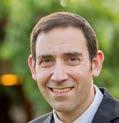
Everything was ready for our longawaited entry into the promised Land. 400 difficult years of wandering and slavery had elapsed since Hashem first awarded this land to our grandfather, and we were now primed to assume our national legacy. We had been regaled by stories of a magical land which flowed with milk and honey, and we currently stood at the doorstep of Israel and upon the perch of history.
The mishkan had been assembled, the population had been carefully counted and the camp was meticulously organized. Everything was ready, until, suddenly, it all fell apart. Though, eventually, it was the meraglim debacle and the Korach insurrection which shattered Jewish history, the fault lines were already evident in parshat Beha’alotecha. Petty complaints about food, false nostalgia about the creature comforts of Mitzrayim, and vicious slander against Moshe all foreshadowed the great collapse which soon followed.
Two prophets named Eldad and Meidad exacerbated the crisis by issuing
unauthorized prophecy. Chazal depict them as two potential candidates for the Sanhedrin who were excluded in the final cut. Disenchanted with their exclusion they prophesied without authorization. This unlicensed prophecy was so toxic, that Yehoshua encouraged Moshe to incarcerate these two rebels.
As Yehuda Halevi remarks in the Kuzari, our nation was chosen by Hashem precisely because of our unique ability to process prophetic information. During the first Mikdash thousands of prophets guided both personal and national behavior. The 48 prophets in Tanach are merely a small cross-section of the countless nevi’im who operated during this supernatural era.
Yet, prophecy must be carefully regulated, so that it doesn’t degenerate into spiritual anarchy and moral chaos. Imagine the mass confusion in a climate of unrestricted prophecy. Worse, imagine the scenario described in parshat Shoftim, of a false prophet who misleads us into religious violation. Sadly, religious history has been marred by false prophets who speak fraudulently in the name of God. The unlicensed prophecy of Eldad and Meidad threatened the regulation of prophecy and the accuracy of divine instruction.
However, it wasn’t just that they prophesied, but what they prophesized about.
According to one opinion in Chazal these two renegade prophets predicted the future battles of Gog U’Magog and it was these war stories which made their prophetic recital so alarming.
We are meant to await Moshiach, but to not pry too deeply into the intricate and mysterious details of the Messianic era. Both Ya’akov Avinu and Daniel the navi attempted to map the Messianic process, but were rebuffed by Hashem. Focusing too sharply upon the bright future of utopia can distract us from the “dreary” affairs and responsibilities of our current boring situation. Messianism can easily slip into escapism. Jewish consciousness is delicately balanced between the “here-andnow” and the golden future we anxiously await. Broadcasting exciting details about Gog U’magog upended this extremely delicate calibration.
However, there was a specific danger in highlighting future Messinaic wars. Beyond violating our general aversion to Messianic whimsies, the Gog u’Magog prophecy was subversive to the social fabric.
Redemption is a transformation of our current order. This transformation of history may be gradual, or it may be dramatic; Messianic details are very grainy and, to a degree, the open-ended arc of Moshiach is dependent upon our behavior. Ultimately though, whether gradually or instantaneously, the Messianic era will induce major shifts in our current reality. We celebrate democracy, but Moshiach will be a monarch. We are repulsed by the thought of animal sacrifices, but the Mikdash will restore all those ceremonies. Most of the

is reluctant to send Yishmael away and Yitzchak seeks reconciliation with Yishmael and seeks to bless Esav.
Jewish people aren’t classically religious, yet Moshiach will generate a widespread religious revival.
Hashem’s unobscured entry into history and the clarity of the Messianic era will each be so transformational that our culture will shift, our attitudes will be altered, and the current world order will be radically overhauled. Messianic commitment requires apocalyptic vision and the belief that our world can, and will, one day, change.
6th Aliya (25:1-11) Avraham marries Keturah; they have 6 sons. All that Avraham has goes to Yitzchak; these are sent eastward with gifts. Avraham dies at age 175; he is buried by Yitzchak and Yishmael in Ma’arat Hamachpelah. Yitzchak is blessed by G-d: he lives in Beer L’chai Roi. The transition from Avraham to Yitzchak is complete. While G-d has been a silent partner in this parsha, here He completes the generational transfer – He blesses Yitzchak. The Jewish people will be Yitzchak and not Yishmael.
7th Aliya (25:12-18) The generations of Yishmael are enumerated. Yishmael dies. His descendants dwell from Egypt to Assyria. Yishmael’s story is brief. He has numerous and powerful offspring. The brevity
Yet, excessive apocalyptic vision foments anti-establishment sentiment and rebellious behavior. If our humdrum reality will soon be overturned and the current symbols of authority have an expiry date, their transient authority will become less compelling and more brittle. Envisioning an apocalyptic tidal wave which washes away current conventions subverts the current social foundations and the existing Establishment.
is to emphasize that the Torah is not as interested in the history of power as in the history of covenant of G-d with the Jewish people. And that will be told at great length.
Jewish authority. Ironically and thankfully, Chassidut had the exact opposite effect, and in many unexpected ways has bolstered Rabbinic authority.
The theme of this week’s haftorah echoes the theme in our parsha which mentions both the death of Sarah and Avraham.
By mesmerizing the nation with dramatic war stories, these two maverick prophets were enflaming Messianic fever and, perhaps unintentionally, challenging Moshe’s authority. Effectively they were undermining Moshe’s authority explicitly by prophesizing without authorization and implicitly by depicting apocalyptic wars which would terminate history and render his current leadership irrelevant.
King David was an older man and a woman was assigned to him to serve him and provide warmth.
Adoniyahu, one of King David’s sons, began to prepare for ascension to his father’s throne. This was despite the fact that King David expressed his wishes that his son Shlomo succeed him.
Additionally, reports about future Messianic wars radicalize latent militant tendencies. On paper, wars excite national pride and promise future success. In reality, war causes extreme suffering and agonizing loss of life. Too much discussion of apocalyptic battles creates a warlike culture, which disregards the value of human life.
Adoniyahu convinces two very significant personalities - the High Priest and the commander of King David’s armies - to
BY RABBI CHANOCH YERESIn some ways this is what made Chassidut so threatening: Drawing upon kabbalah, Chassidut brought redemption and Moshiach to the forefront of religious consciousness. In addition, by posing a new model of Jewish leadership, it implicitly challenged the governing Rabbinic establishment. This volatile combination of modifying Jewish leadership coupled with the fueling of Messianic fervor could have potentially sabotaged the institutions of
Rav, Beit Knesset Beit Yisrael, Yemin MosheWhen Avraham addresses the people of Cheit, trying to acquire a burial spot for his wife, he says “Ger V’Toshav Anochi Eimachem” (23:4) “A Stranger and a Resident am I with you”
This seems to be a contradiction. If one is a stranger than he is not a resident, if he is a resident than he is no longer a stranger. What did Avraham mean?
The Magid of Dubno (Jacob ben Wolf Kranz 1741-1804) explains that Avraham watched how he spoke in this tense situation in order to, both, state his truth and be able to keep the peace -Shalom Bayit. Avraham said, on the one hand, “I am a Resident’ due to G-d’s promise to receive this Land and on the other hand, I still need your agreement to purchase a plot. In other words, Avraham implied “I am the resident” and you are the “strangers”, while they understood him as saying that “they” are the residents and Avraham is the stranger. The peace was kept, and Avraham remained true to his ideals.
Shabbat ShalomWe are a young senior couple looking for a 1 bedroom furnished apartment in Jerusalem from December 2021-June 2022

Obviously, the end of days includes punishment for the wicked and possibly, even global warfare in which those who challenge Hashem and His historical design are subdued. The final accounting of history includes the death and elimination of the wicked. Yet the era of Moshiach will be characterized by accord and universal welfare and not by darkness or suffering. Most upstanding human beings will be redeemed by Moshiach, rather than extinguished by him. Too many war fantasies paint Messianic experience as hostile and violent and obscures the ultimate Messianic goal of human welfare.
This peril is even more acute in Israel
0524419731
where we have, effectively, been at war since the inception of our State. Baruch Hashem, and with His help, we have become a military superpower and have fiercely defended our Homeland and our historical rights. However, war breeds a belligerent culture of confrontation and when this culture is coupled with Messianic fervor it can explode into unrestrained aggression and the cheapening of human dignity. Peace is Hashem’s greatest gift to Mankind but, sadly, it remains elusive in the Land of God.
Finally, too much apocalyptic fervor can deflect responsibility and accountability. The seductive promise that major wars and extreme makeovers will eventually re-landscape our reality, releases us from the responsibilities of our current condition. If everything is in the hands of Hashem and he
will eventually remodel our world anyway, why should we labor in the trenches of our current struggles? There is an immensely satisfying and cathartic comfort in releasing ourselves from responsibility, while relying upon the larger forces of fate to shape our lives.
This desire to be released from responsibility is the allure of determinism. By viewing fate as predetermined I am released from moral struggle. In a different way this apocalyptic release is behind modern culture’s obsession with dystopian movies and books. If the world will be overrun by zombies anyway, I am acquitted from ethical decisions and from responsible behavior.
We await Moshiach, but aren’t preoccupied with the shadowy details of this future era. We certainly don’t obsess about apocalyptic wars, and we don’t celebrate war.
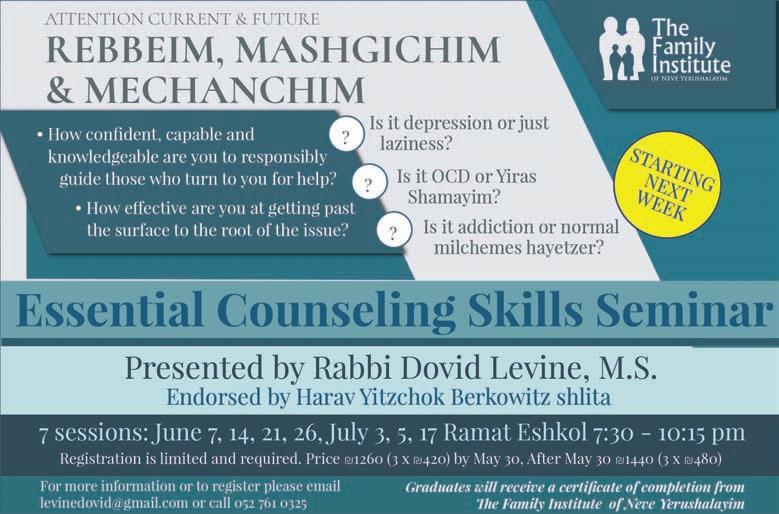
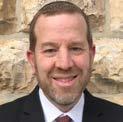
Were it not for the nourishment it receives from the dew-of-life of the sanctity of the Land of Israel, Judaism in exile would really have no actual basis - only vision of the heart, founded on pictures of hope and rare reflection, of the future and the past. However, there is a limit to the power of this imaging to carry the vision of life and pave a way for the life of the people, and it would seem that this quota has already been filled.
Therefore, Judaism in exile goes down drastically, and there is no hope for it other than planting it in the source of life, real life, of essential holiness, which may be found in the Land of Israel.
Even one spark of this real life will vivify a great multitude of visionary life. The real life of the sanctity of Judaism cannot be revealed other than by the Jewish people’s return to its Land, which is the way paved for its renascence. All the sublimity in its soul and heart’s vision will rise to life in proportion to the place occupied by the practical foundation to revive the fainting vision.
(Eretz
ChefetzRav Kook in the passage above dramatically argues the critical role of Israel regarding the very survival of the Jewish people in exile. When the close ties to the Land of Israel wither, then the Jews in exile are in danger of withering away as well.
In a similar vein, Rabbi Joseph Soloveitchik strikingly echoes this theme in his seminal address, Kol Dodi Dofek. On Israel's Independence day, eight years after the formation of the modern State of Israel, Rabbi Soloveitchik spoke of the immense challenge which faced the Jewish world at that time, following the catastrophic days of the Holocaust, of assimilation and the “impulse to flee from Judaism” that had become commonplace among the Jews of America. He exclaimed, “were it not for the new State of Israel appearing on the world stage, droves of Jews would have easily vanished. But the new State has forced the Jew to reassess his commitment and his place among the nation.”
Rabbi Soloveitchik powerfully added: “The very fact that people are always talking about Israel serves to remind the Jew in flight that he cannot run away from the Jewish community which he has been intertwined from birth….Buried, hidden thoughts and paradoxical reflections emerge from the depths of the souls of even the most avowed assimilationists.”
(Fate And Destiny, Ktav, pp. 29-31).
Rabbi Soloveitchik accentuated this
4:13, Naor Translation)
point with the following verse in the Torah: “And I will remember my covenant [with] Jacob…And I will remember the Land” (Vayikra 26:42). The Land will call out to the Jew at a point when assimilation will be at its worst: “Take away Eretz Yisrael and the Jews of the diaspora will be engulfed by a tremendous wave of estrangement and assimilation…when you reach the stage of “You will become lost among the nations” (Vayikra 26:38); when you will be in turmoil, dumbfounded, afraid; when you no longer want to be recognized as Jewish…The covenant of Abraham will boom forth from the radio, all the newspapers will point out the Jew, his particular problems, his stubbornness as well as his cast-iron determination. The shadow of Abraham our father will pursue you. Do you know how? By Eretz Yisrael - and I will remember the Land.” (The Rav Speaks, pp. 150-151, also quoted in Mesoras HaRav Chumash, Vayikra, p.233)

There is a very famous “Meshech Chochma” on the tochacha found in parshat Bechukotai (Vayikra 26: 44). Rabbi Meir Simcha of Dvinsk (1843-1926) says the following: “If the Jew thinks that Berlin is Jerusalem…then a raging storm will uproot him by the trunk and subject him before a faraway gentile nation…and a tempest will arise and spread its roaring waves, and swallow and destroy, and flood
forth without pity. Therefore you will not be calm, nor shall there be a resting place for the sole of your foot; that is a blessing, for as long as the Jewish people are uncomfortable in exile, they will yearn to return to their Homeland.
Twenty-five years before the Holocaust, Rabbi Meir Simcha was a strong supporter of the settlement of Eretz Yisrael and greeted the Balfour Declaration with enthusiasm. In this remarkable near-prophetic passage written before 1926, he presents a brilliant theory of Jewish history in the Exile and asserts that those who forget their origins, thinking “Berlin is Jerusalem,” are doomed to destruction.
Rebbe Nosson’s Prayer

Rebbe Nosson of Nemirov in his Likutei Tefilot, which are his original prayers based on the teachings of Rebbe Nachman expresses his longing for Israel and emphasizes the dependence of the Jew on Israel (Likutei Tefilot Section 1:20):
“Have mercy on me! Arouse Your great love and kindness for me and help me go to the Holy Land soon. Eretz Yisrael is the very source of our holiness, as You know, Hashem. All our holiness, our purity and our very identity as Jews depend on Eretz Yisrael.”


ZECHARIA 2:14 - 4:7
In this week’s haftorah the Navi speaks of a time when the Jewish people will be the beneficiaries of remarkable financial success. Zecharia describes a vision of a person
under a grape vine and another under a fig tree, reflecting the bounty of the Jewish people. A closer look at the posuk however, reveals that it is not simply that each man has a tree to provide him with shade and sustenance, but on that day says Hashem,
The ultimate expression of joy is experienced when people seek to share with others. The posuk emphasizes that every man will call to his friend to invite him to join him under his tree. Not only will the people be blessed with the wealth of the Land of Israel, but they will be additionally blessed in that they will seek to share their material blessings with others. Economic prosperity is described so poignantly as each man calls to the other from under their respective trees.
On that day—declares Hashem, Master of Legions - each man will invite his fellow beneath the vine and beneath the fig tree.
What is the significance of each man calling to his friend under these trees rather than the more familiar verse describing each man sitting under a tree?
Why does Zecharia specifically speak of fig trees and grape vines? Why do these trees represent the ultimate symbols of peace and freedom? Figs are sweetest and most prized in their natural fresh state, while wine requires effort and time. Figs represent the present and grapes, the future. The message of the Navi Zecharia now becomes clear. Not only will the people be blessed with enjoyable fruit, but they will also be able share these blessings of the present peace and future tranquility. May Hashem create this idyllic setting so that we may discover the unique expression of peace to share with one another.
In the heart of calm and pastoral BAKAPrivate arab house, 6 rooms, 500m + possibility of building 250m, huge garden, approx. 700m, completely renovated, underfloor heating + a/c, large parking, 5 bathrooms, 5 toilets, green
MENDEL 0528980111
Ran: 054-5561223
Arthur Samuels, DPM

PODIATRIST
Over 30 years experience

Licensed in Israel & America

053 427 6363



ArthurMSamuels@gmail.com
CINEMA CITY MALL, JERUSALEM
CINEMA CITY MALL, JERUSALEM
Please note the updated mailing address for the OU Israel Center: OU Israel
22 Keren Hayesod
POBox 1441
Jerusalem 9101302
For Sale: Ben Maimon, 4 rooms, 113m, 2 bathrooms, porch, 1st floor, elevator,
6.2 million NIS
Smadar 050-3114040 // 02-642-4329
smadi_bida@walla.co.il
BAKA - New penthouse, 4 rooms in a small luxurious building with character, alone upstairs, 3rd floor + elevator, 4 orientations, 3 toilets, 2 bathrooms, terrace / sukkah, 70m, parking, store-room
5450000 NIS MENDEL 052-8980111
MOSHAVA / In a building after TAMA 38, new apartment, 4 rooms, 3rd floor + elevator, balcony/partial sukah, opened sight, 2 bathrooms, calm, parking
MENDEL 052-8980111
BAKA / MEKOR HAIM - 4 rooms, 90m, 2nd floor + elevator, completely renovated, fireplace, a/c, gas heating, very central, close to all amenities
MENDEL 052-8980111
Near Arnona Hatzaira, in a step building, very large 5-room apartment + balcony/sukkah, 40m, renovated, 3rd floor, private entrance, quiet, potential for extra independent unit
MICHAEL 052-3202488
ARNONA – 3 rooms, that will be transformed to 90m, 3rd floor with elevator, store-room, parking
ONLY 2550000 NIS
MICHAEL 052-3202488
In the pastoral BAKA - quiet and central, stunning villa 350m, in a magical atmosphere, designed, pool, 4 bedrooms, cinema room and more, 4 bathrooms, garden, parking
MIKAEL 052-3202488
ARNONA HATZEIRA - Very spacious penthouse, 120m, 4th floor + elevator, huge terrace / succah, 75m, open view, 2 parking spaces, cellar, 3 toilets, quiet, completely renovated, immediate entrance
MICHAEL 052- 3202488
One person’s trash is another person’s treasure…
We buy old sifrei kodesh, judaica gold, silver, coins, collectables, banknotes, antiques and more…
Question: As a guest to a shul, I received an aliya on Shabbat morning, and at Mincha, a different gabbai came over to me between aliyot to ask me my name. I told him: “I got an aliya this morning.” He got the hint and gave it to someone else. Did I act properly, or was that considered refusing an aliya?
Answer: The gemara (Berachot 55a) lists “one who is given a sefer Torah to read and he does not read” as one of three things that shorten a person’s life. One can see this not as a prohibition to turn down an aliya but advice not to, although, as people who seek life and take Chazal’s ideals and advice as the basis of their actions, it may be equivalent. The Rif and Rosh (Berachot 9:4) cite this gemara as halacha. Therefore, your words, which apparently effectively turned down the opportunity to read Torah most classically (i.e., an aliya) needs justification; there are four grounds for leniency to consider.
The Rambam and Shulchan Aruch omit
 RAV DANIEL MANN
RAV DANIEL MANN

this “halacha,” which arouses much discussion among Acharonim. One answer is that the gemara refers to the original situation, when the oleh also lained (Eliya Rabba 139:2), so that refusing an aliya was withholding teaching Torah, whereas for the last hundreds of years, refusing an aliya has no major consequences. This approach, though, is insufficient alone to allow refusing an aliya, as most poskim and the minhag follow the Magen Avraham (53:22) that the issue exists with even today’s aliyot.
Several sources allow refusal when done with a good cause. This can have a fundamental justification – the problem is belittling the importance of Torah study, and therefore when one refuses for due cause, there is no belittlement (see Radbaz III:304; Torah Lishma 228). Alternatively, even if it is insulting to the Torah, sometimes the need leaves us with little choice. There is a story of Rabbi Akiva who turned down an aliya because he had not sufficiently prepared the parasha (see Tanchuma, Yitro 16), and the Mishna Berura (139:1) rules to follow this precedent. Another example is if one was called for an aliya after his brother (Sha’arei Ephrayim 1:33), and Shevet Hakehati (IV:50) justifies refusal to enable a pre-yahrtzeit to receive maftir. There is a machloket (see Torah Lishma 428 and Tzitz Eliezer, XIV:34) whether embarrassment of one who is too poor to offer an expected donation suffices
The Orthodox Union - via its website - fields questions of all types in areas of kashrut, Jewish law and values. Some of them are answered by Eretz Hemdah, the Institute for Advanced Jewish Studies, Jerusalem, headed by Rav Yosef Carmel and Rav Moshe Ehrenreich, founded by HaRav Shaul Yisraeli zt”l, to prepare rabbanim and dayanim to serve the National Religious community in Israel and abroad. Ask the Rabbi is a joint venture of the OU, Yerushalayim Network, Eretz Hemdah... and OU Israel’s Torah Tidbits. for refusal. However, in your case, no one needed to be embarrassed – the gabbai didn’t know and you need not be more than slightly uncomfortable lest someone think it is “not fair” you got two aliyot. Poskim were very against using a reason to refuse that is not convincing enough (see Lev Chaim III:12).


The third ground for leniency is the fact that the gabbai did not call you up but just demonstrated that he planned to. The Machatzit Hashekel (to Magen Avraham ibid.) claimed that the similarly sounding Magen Avraham and Knesset Hagdola (cited ibid.) disagree whether the problem of refusing the aliya applies only when one is actually called (MA) or from when it becomes apparent that he is slated for it (KHG). The Chida (Chayim Sha’al I:13) posits that the Sephardi minhag of informing the oleh to stand up without calling his name is to shield him from consequences if he turns it down. In short, it is an open question if his asking you your name bound you.
The most promising leniency in your case is that you apparently did not turn down

the aliya. It is not just that you did not say so explicitly but implicitly, but your reaction falls short of refusal. You simply gave the gabbai information that afforded him the option of rethinking his plan of calling you. I have witnessed similar cases where the gabbai moved on to the next person, and others in which he said, “That’s okay, have another one!” If the gabbai said the latter, I would have urged you to thank him and show your willingness to come up. However, since he did the former, he did nothing wrong by not calling you up for another aliya, and you did nothing wrong by just allowing him to correct his mistake.

 BY RABBI MOSHE BLOOM en.toraland.org.il
BY RABBI MOSHE BLOOM en.toraland.org.il
Last week we discussed the bikkurim festivities in the early Zionist period. Today we will address the question: by calling fruit from the seven species bikkurim, does this actually consecrate the fruit?
The Mishnah (Shekalim 8:4) states that the mitzvah of bikkurim applies only during the time of the Beit Hamikdash; first fruits cannot be brought after its destruction. If shekalim and bikkurim are designated in the absence of the Beit Hamikdash, the tanna kamma (first opinion) maintains that they are consecrated, while Rabbi Shimon disagrees.
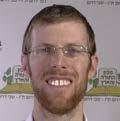
Ra’avan maintains that fruit designated as bikkurim today become consecrated. Minchat Chinuch seems to agree. Since today we cannot place the basket before the mizbe’ach, the fruit may not be used and must be left to rot.
Bartenura, Rabbi Yishrael of Shklov, and others follow Rabbi Shimon’s ruling. They maintain that these fruits are not sacred even if specifically designated as bikkurim. While Rambam’s opinion is unclear, many Acharonim believe that Rambam maintains that these fruits are not consecrated. This is different than ma’aser sheni, neta revay, and the first born kosher
mammals, all of which have holy status even though they cannot be eaten.
Rabbi Kook writes that bedia’avad, in the case of the kibbutzim, where the intent of the celebrants is clearly not to bring their first fruits to the Beit Hamikdash but rather to celebrate the agricultural revival in the Land of Israel, the fruits do not become forbidden to eat. However, certainly lechatchilah one should avoid designating fruit today as bikkurim. In a letter to the residents of Nehalel in 1933, Rav Kook suggests they call the festival “Zecher Labikkurim,” a commemoration of the bikkurim, as opposed to just bikkurim. He also praises them for their desire to celebrate the event near Shavuot. Rabbi Uziel in 1944 also recommended to members of Kibbutz Tirat Tzvi to call it Zecher Labikkurim and added that it has a positive element of remembering the Beit Hamikdash, especially when including prayers for the reinstatement of bikkurim.
In conclusion: while most posekim maintain that it is not possible to consecrate bikkurim today, lechatchilah this should be avoided. However, ceremonies held in remembrance of the bikkurim are both educationally and halachically positive events.


Last time we saw the responsa by Rabbi Wosner that a pregnancy outside the uterus is not considered a pregnancy in halachic terms in relation to pidyon haben. A child born after an ectopic pregnancy, that occurred outside of the uterus, would still be obligated in a pidyon haben. Can we use this same logic when dealing with a woman born with two uteruses, uterus didelphys?
If the two uteruses are considered separate entities, and each one is not a uterus in relation to the other one, then a pregnancy that occurred in one of them is considered "outside of the uterus" in relation to the other uterus. If a woman got pregnant in the left-hand uterus, delivered the baby and redeemed it, and then got pregnant in the right-hand uterus, the baby would still need to undergo pidyon haben.
In such a case the woman would have two children who are both considered the firstborn! Rabbi Meir Simcha of Dvinsk, wrote in his famous commentary on the Rambam, the Or Sameach, (Laws of The First Born, 11:16) that the Torah explicitly calls the human firstborn the bechor in the singular, since each woman can only have one child who is a firstborn. Once the womb is opened, any other offspring cannot be called the first-born. Even

if two children are born at exactly the same time, both heads coming out together, only one can be called the first-born. In the case of doubt neither of them needs to be redeemed, but they do not both need to undergo a pidyon haben.
According to the Or Sameach, in our case once the first child has been born the next son will not undergo a pidyon haben, even though he was conceived and delivered from a separate uterus.
However, Rabbi Yonatan Eibeshutz, in his book of sermons, Yearot Dvash, writes (Vol. II, 9) that Yocheved was rejuvenated before giving birth to Moshe as though she had never had children. When Moshe was born, he underwent a pidyon haben.
Even though this is a Midrashic explanation, it implies that the hard and fast rule stated by Rabbi Meir Simcha, that a woman can only have one child who needs a pidyon haben, is not completely correct. It is possible, even though extremely rare and unlikely, that a woman would have more than one child who would need a pidyon haben.
A woman born with two uteruses is also a rare occurrence, but it does happen. Could we therefore claim that sons born from both her uteruses would need a pidyon haben? More on this next time.
The Puah Institute is based in Jerusalem and helps couples from all over the world who are experiencing fertility problems. Offices in Jerusalem, New York, Los Angeles & Paris. Contact (Isr) 02-651-5050 (US) 718-336-0603 www.puahonline.org

On a recent Tuesday morning in Jerusalem, parents were feeding their 6-month-old baby and introduced him to tahini for the first time. Within minutes, the baby developed a severe allergic reaction. The infant's parents immediately called emergency services, seeking urgent help.
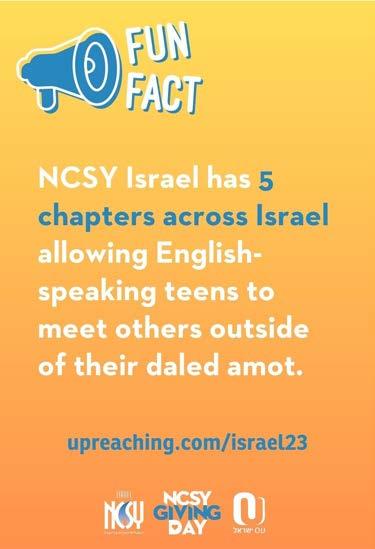




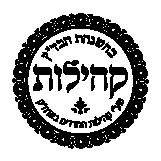

United Hatzalah volunteer EMT Shalom Klein, alerted to the emergency through his proximity alert system, sprang into action as the first responder on the scene. Arriving promptly, Shalom was confronted with a distressing sight - a baby boy with swollen lips and tongue, struggling to breathe, and covered in a worrisome rash.


Recognizing the symptoms as indicative of an anaphylactic shock, the volunteer knew immediate intervention was crucial. Without hesitation, he administered a life-saving EpiPen injection, delivering a dose of epinephrine to counteract the severe allergic reaction. The powerful medication quickly took effect, and the infant's breathing became less labored. The swelling in the lips and tongue began to subside, providing much-needed relief to the child.
As the symptoms continued to recede, the EMT monitored his condition while awaiting the arrival of a mobile intensive care ambulance. Several minutes later, the ambulance team arrived and transported the infant to the nearest hospital for further treatment and observation.
Reflecting on the incident, Shalom emphasized the importance of having an EpiPen readily available. "It's a great thing I had an EpiPen in my medical kit," he stated. "An EpiPen can save a person's life within minutes and is a huge help for both EMTs and patients."
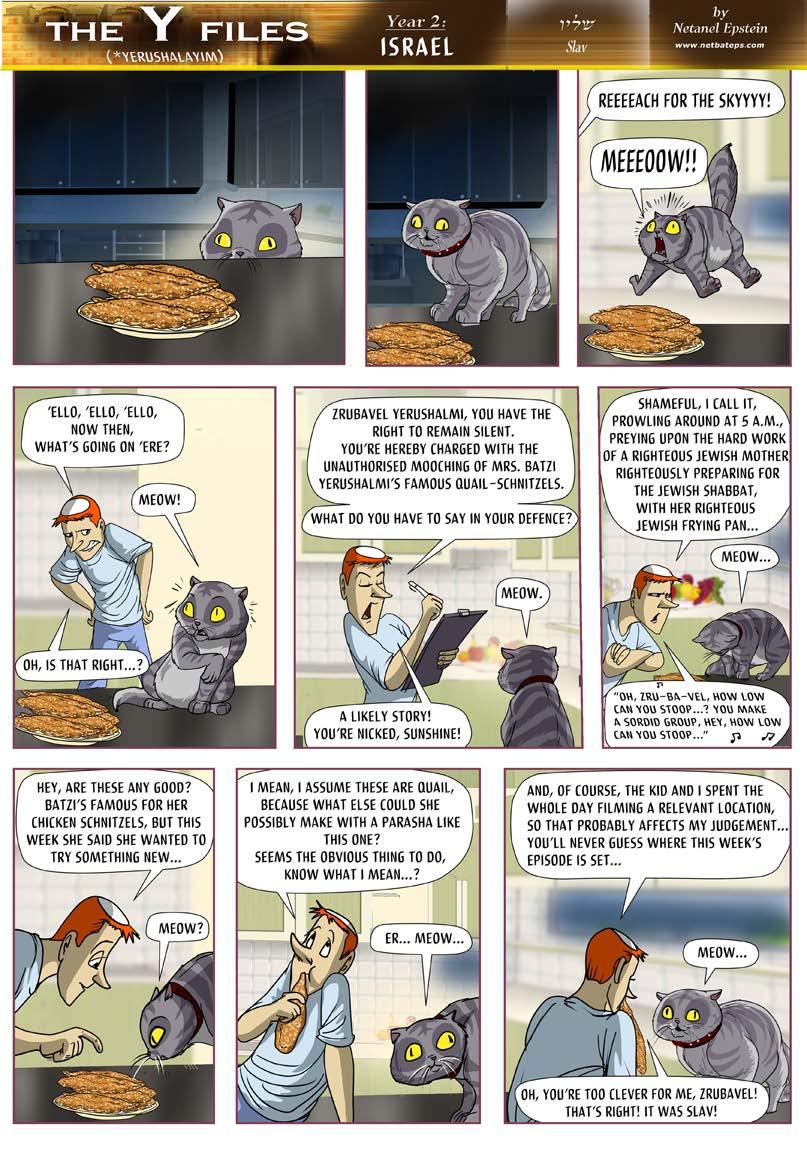
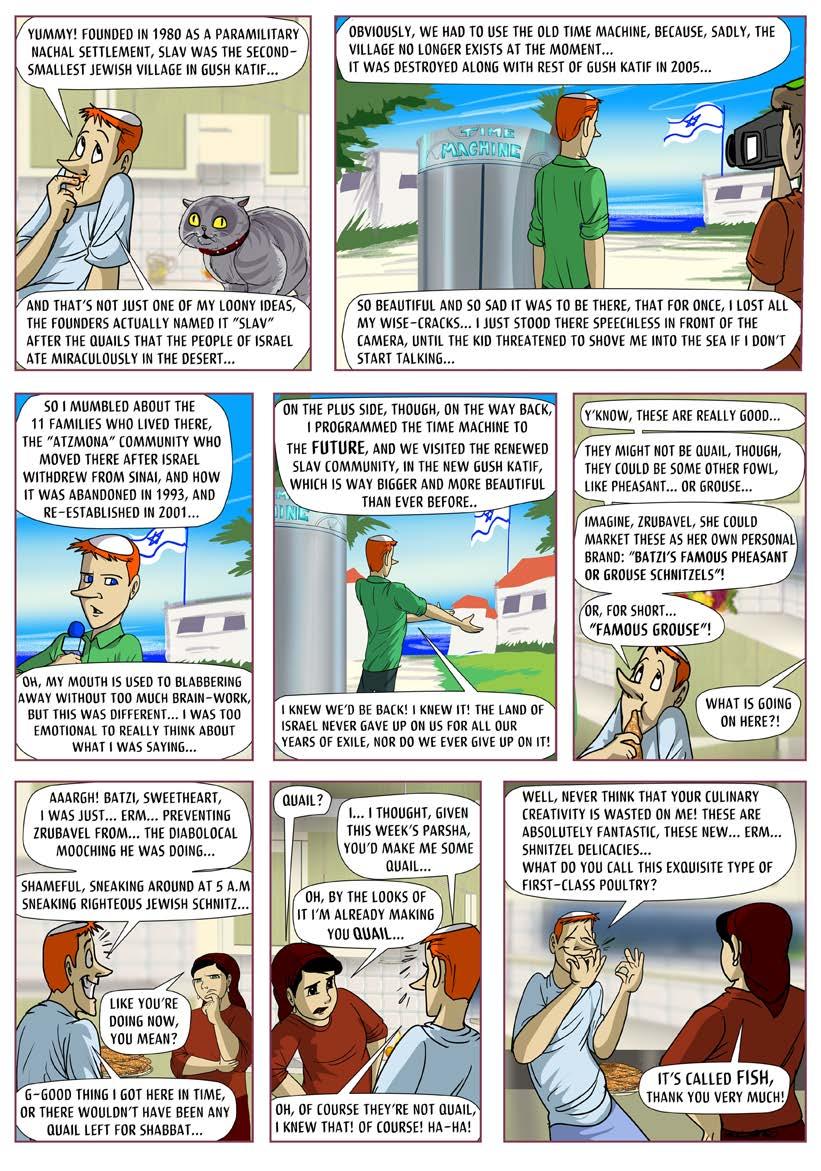

 Ariel
Ariel
This week’s parsha addresses the challenges and responsibilities of leadership. We see that Am Israel complain about their hardships. First, generally as an unspecified complaint (ג-א א"י קרפ), but then a more specific complaint that seems somewhat absurd: “The rabble with them began to crave other food, and again the Israelites started wailing and said, “If only we had meat to eat! We remember the fish we ate in Egypt at no cost” (ה-ד א"י קרפ).
Am Israel seems to have forgotten that in Egypt they had been slaves, and that they had cried out to be freed by God. There was something so horrible about this behavior that it induced Moshe into a breakdown, as he turns to Hashem and says that he cannot carry the weight of the people on his own.
Hashem responds by instructing Moshe to gather seventy elders to share the leadership burden with him. We learn from this about leadership and the importance of collaboration. Moshe recognizes that he cannot bear the weight of leadership alone and seeks assistance.
The Rambam, in הרות הנשמ, reflects on the qualities of a good leader. He writes in Hilchot Melachim (ו:ב): “A king should be of great stature and the most outstanding in his generation, surpassing all others in his wisdom and understanding. He should be gentle and lowly of spirit, for the higher a person rises, the humbler he should become.”
From the Rambam’s words, we learn that leadership is not about wielding power but about humility and wisdom. A true leader should prioritize the wellbeing of his people and show compassion and understanding.
The selection of the seventy elders also highlights the significance of shared responsibility within a community. This teaches us that true leadership is about serving the people and seeking their collective welfare.

In this week’s parsha we begin reading about the instructions for the lighting of the menorah in the mishkan. The menorah represents the divine light, symbolizing the presence of God among the nation. The act of lighting the menorah is a reminder that each person has the potential to bring light and holiness into

the world. It teaches us that leadership is not just the responsibility of a chosen few but is a calling for all individuals.
Later on in the parsha, we encounter the nation complaining about how they are tired of eating manna and want to eat meat. Moshe rabbenu gets very overwhelmed by the people’s complaints and asks Hashem for help. Hashem then instructs Moshe to gather seventy elders to share the burden of leadership. This act highlights the importance of delegating responsibility and recognizing the unique strengths and abilities of others.
We also witness the pivotal moment when Miriam is afflicted with tzaraat as a result of speaking lashon hara about her brother. This incident teaches us about the destructive power of gossip and the necessity of cultivating a community rooted in love, respect, and positive communication.
As we study this week’s parsha we should be inspired to embrace our own leadership potential and to cultivate an environment of unity, respect, and kindness within our communities. May we strive to be sources of light, bringing holiness and positivity into the world, and may we recognize the inherent value and power of each individual in the pursuit of a better and more harmonious society.
We can learn a lot about ourselves from this week’s parsha and it should be a mirror to look into and reflect from and see how we ourselves can contribute to our own communities. We should be open and willing to better ourselves as a person to better our surroundings and bring a more positive light into the world.

